B.Arch,Harbin Institute of Technology
Selected works from 2018-2022

YU LI
PORTFOLIO
FINDING
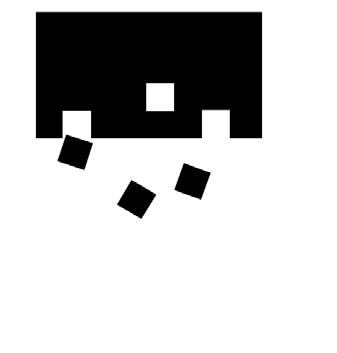
Today, it is also of great significance to explore various building materials and Intelligent manufacturing methods.
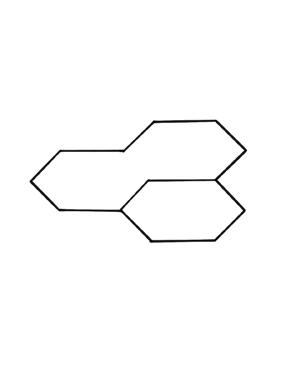
When was walking down my neighbourhood as a kid, I was always surrounded by series of box-liked buildings. Ever since then, I tend to perceive buildings as square boxes, whether it was a house, a library, or a shopping mall, they all seemed to look the same. By a chance, I learned that my hometown Tangshan experienced a severe earthquake in 1976, and these square boxes are modular buildings that were quickly rebuilt after the earthquake. I began to understand that those repetitive, square boxes are not just boring architectures, they can assume a more urban level of meaning: sheltering people after the disaster.
Gradually, I began to wonder what kind of buildings could be producted rapidly as well as meet the living needs of people. I particapate in many projects to explore novel materials and the methods of rapid construction......


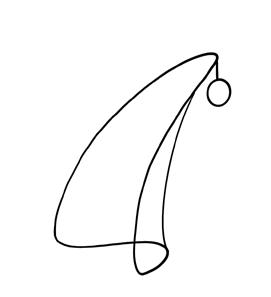

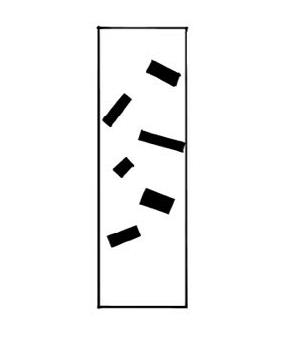
CONTENTS 01 Urban Debris A building that integrates two groups of people in Wuhan 01 Jul.-Aug. 2022 Individual Work 02 The Road To The West Theatre design based on the stories of the Silk Road 08 Apr.-May. 2022 Individual Work 03 Galaxy Office Super high-rise design of office space in the future 14 Oct.-Dec. 2021 Individual Work 04 Live Like Bees Youth entrepreneurship community 19 Jun.-Aug. 2021 Group Work Fabrication Design 05 24 3D clay print Arch 3D clay print research 06 26 Fiber Fabrication Design of carbon fiber woven furniture 07 29 Twinkling Stars Building design and construction competition Dec.2022 Individual Work Jan.2023 Individual Work Jun.2019 Group Work
-01-
Urban Debris
A building that can be used by two groups of people in Wuhan
Jul.-Aug. 2022
Individual Work
location: Wuhan,China
Grade:4
Type: Academic work
Source: Studio Alpha Open Project 220
instructor: Pan Junxuan (from Studio Alpha)
Instructor’s Contact: alfredpun@gmail.com
A spliced city
The site is located in Wuhan, China. Wuhan is a city famous for its water culture, and its superior geographical conditions have made Wuhan one of the most important port cities in China since ancient times. At the same time, the developed economy made a large number of migrant workers poured into Wuhan. A large part of them come to Wuhan wharf to earn a living. This makes the population composition of Wuhan complex.
In this project, I want to create an open space which can be used equally by different people in Wuhan. I select two groups of people with different needs for water along the Yangtze River and analysis the daily activity of them.
I set two types of buildings in the site-- the bathing place and the wharf, serving different groups along the river. There are also some buildings which can be used by all people, such as restaurants, exhibition halls. Different kinds of peopl in the city can just coexist in this place without disturbing each other.

01
Population Analysis :Two kinds of People On The Riverside
In the population analysis, it is found that there are mainly 2 kinds of people along the river. The local people in Wuhan like to play in the water, or taking a bath in the Yangtze River; The workers need to work in the riverside wharf or take a ferry to the work place.
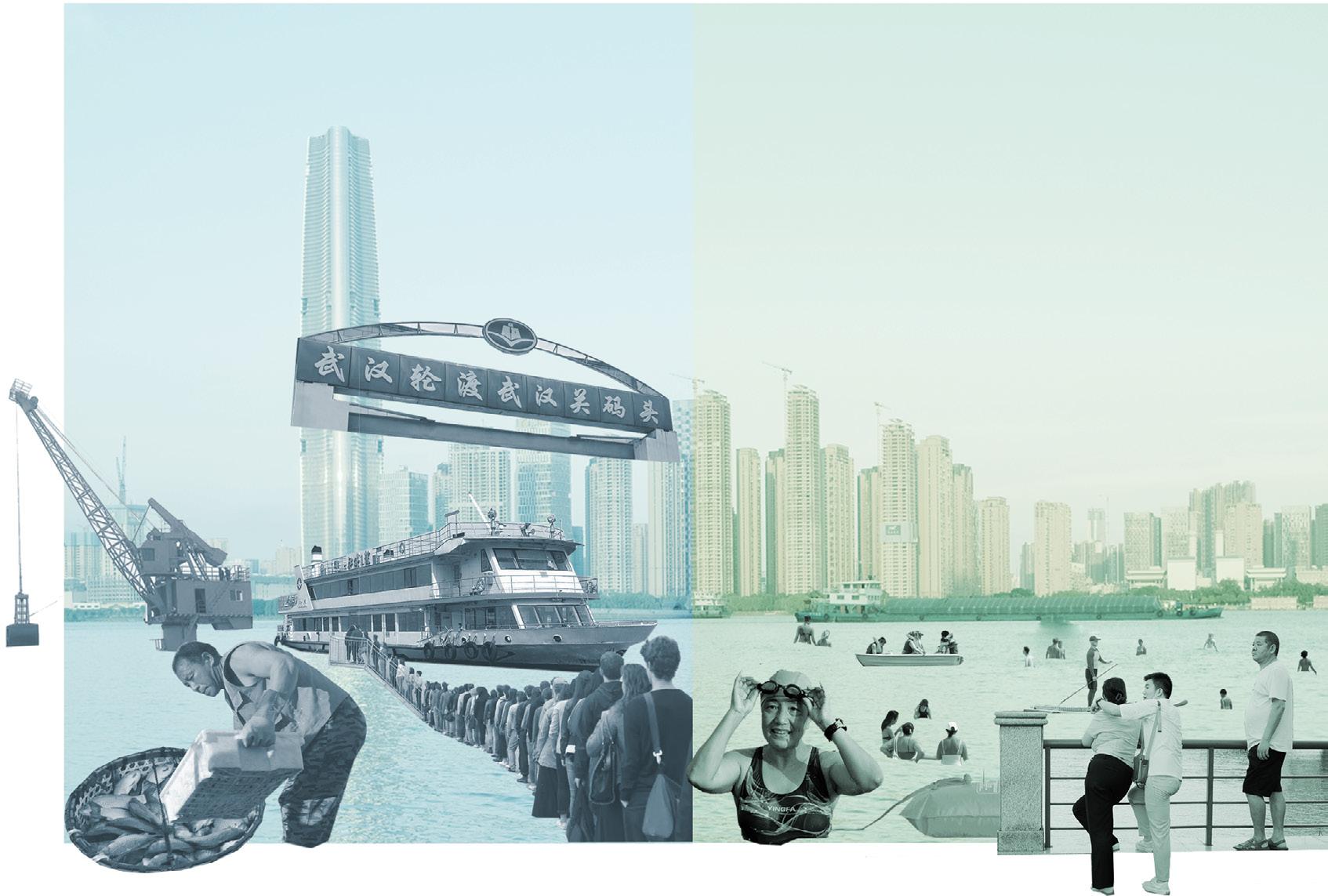
Regional analysis:The Complex Urban Texture of Wuhan


Due to historical reasons, there are many buildings of different periods in Wuhan, forming a complex urban fabric like a city that is spliced together.
The site is located in Jianghan Park, Wuhan City. There are many ferry piers beside the site, and many residents are playing in the river.
Historical Background : Wuhan Culture Formed By Water
Wuhan's wharf culture can be traced back hundreds of years ago. Due to its superior geographical location, Wuhan has always been an important port city. Until several hundred years ago, when countries opened concessions, modern water transport began to develop, and a large number of people poured into Wuhan. Now, Wuhan has formed the status quo of coexistence of multiple docks, cultures and people.
Timeline Number of foreign population Level of economic development Number of modern docks Number of traditional docks Wuhan
important
southern China An
The
Wuhan: Hankou Tianbao
1736 1700 An important port city in China
Workers VS Residents
was an
hub for transportation and trade in
Important Hub for Distributing Commerce and Trade in China
earliest wharf in
Lane wharf
Wuhan’s economy has been greatly improved
The First Cruise Terminal in Wuhan: Baoshunzhan Terminal
The establishment of concessions made Wuhan establish a lot of shipping terminals Workers from all over the country emigrated to Wuhan, and there were about 50,000 dockers. 2000 1940 1900 1863 1800
The development of economy makes more foreign population flow into Wuhan.
water transport industry rapidly developed
Many foreigners came to Wuhan More outsiders are coming to Wuhan
02
Wuhan has developed into a national water transport center
SITE
Concept: Falling Puzzle
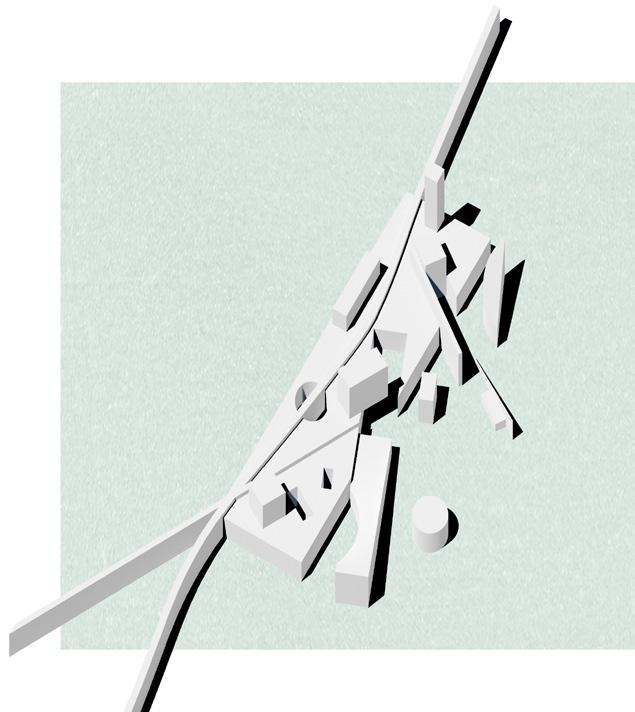

Site Analysis: Site On The Riverside
Since people and buildings in Wuhan are very mixed, I want to follow the urban texture of Wuhan using the jigsaw puzzle as the concept. The different functions of the two groups in the architecture are suitable for their respective adaptation, so that they can coexist in one building
The building site is located in a park by the side of the river, which is surrounded by two square and a viewing platform.there are also 2 ferry terminals besides the site.
Forming Progress: Remove Debris From The Site
Based on the concept and location analysis, I cut different pieces of the site to make them scattered in the water as the space for workers,like Ferry terminal. The corresponding rest spaces as the leisure space for locals ,like bath or cruise ship dock.

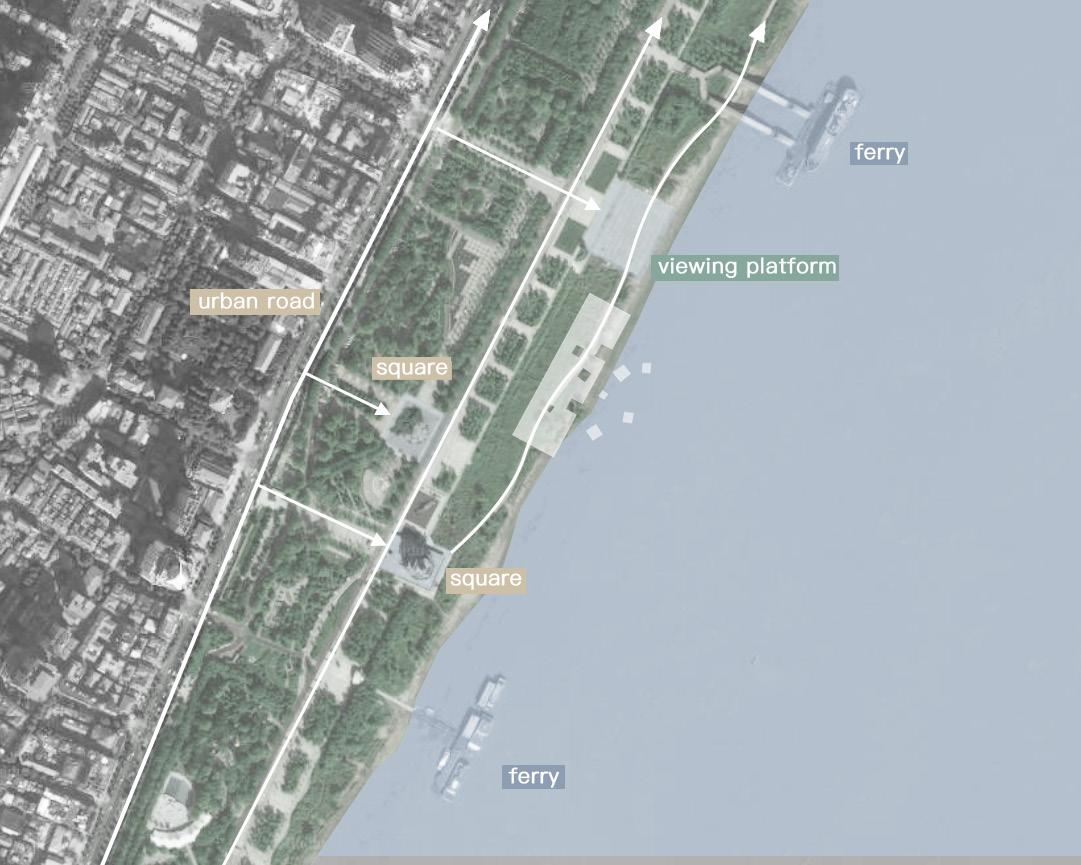
STEP1: adding a road
Adding a road to connect the square and the site,locating the ferry termi nal on the end of the road where can easily access to the urban road.
STEP2: dropping Take off one piece from the land section as Ferry terminal, the rest of it as bath.
STEP3: dropping more Take off more pieces from the site as the bathes .
STEP4: adjusting Adjusting the volume according to the function of use and the axis of the site
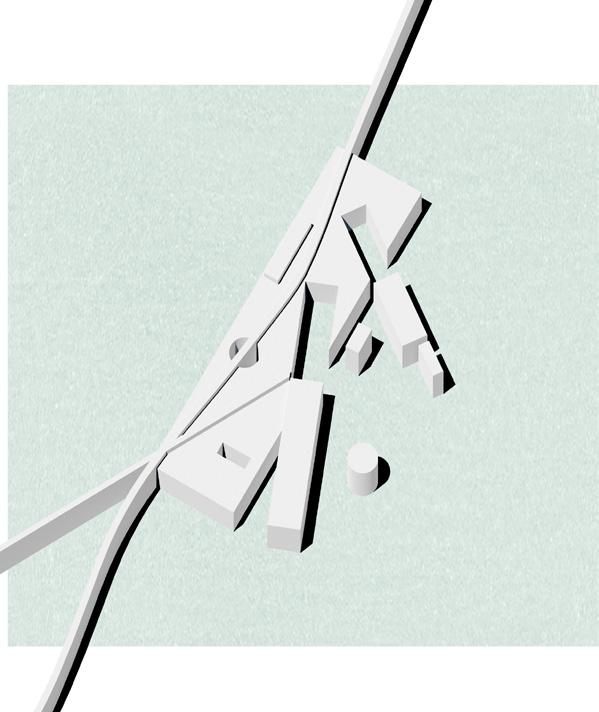


bath
Ferry terminal
Many people enjoy the waterscape here
Working people commute here
03
Different people gather in the square
Function Analysis :Places For Different People In The Building

The site is distributed with buildings that can be used by two groups of people, and some buildings that can be used by all the people.

work both leisure route of ferry route of boat
Bath
For people to swim
Single Building Analysis: Relationship Between Architectural Form And Users
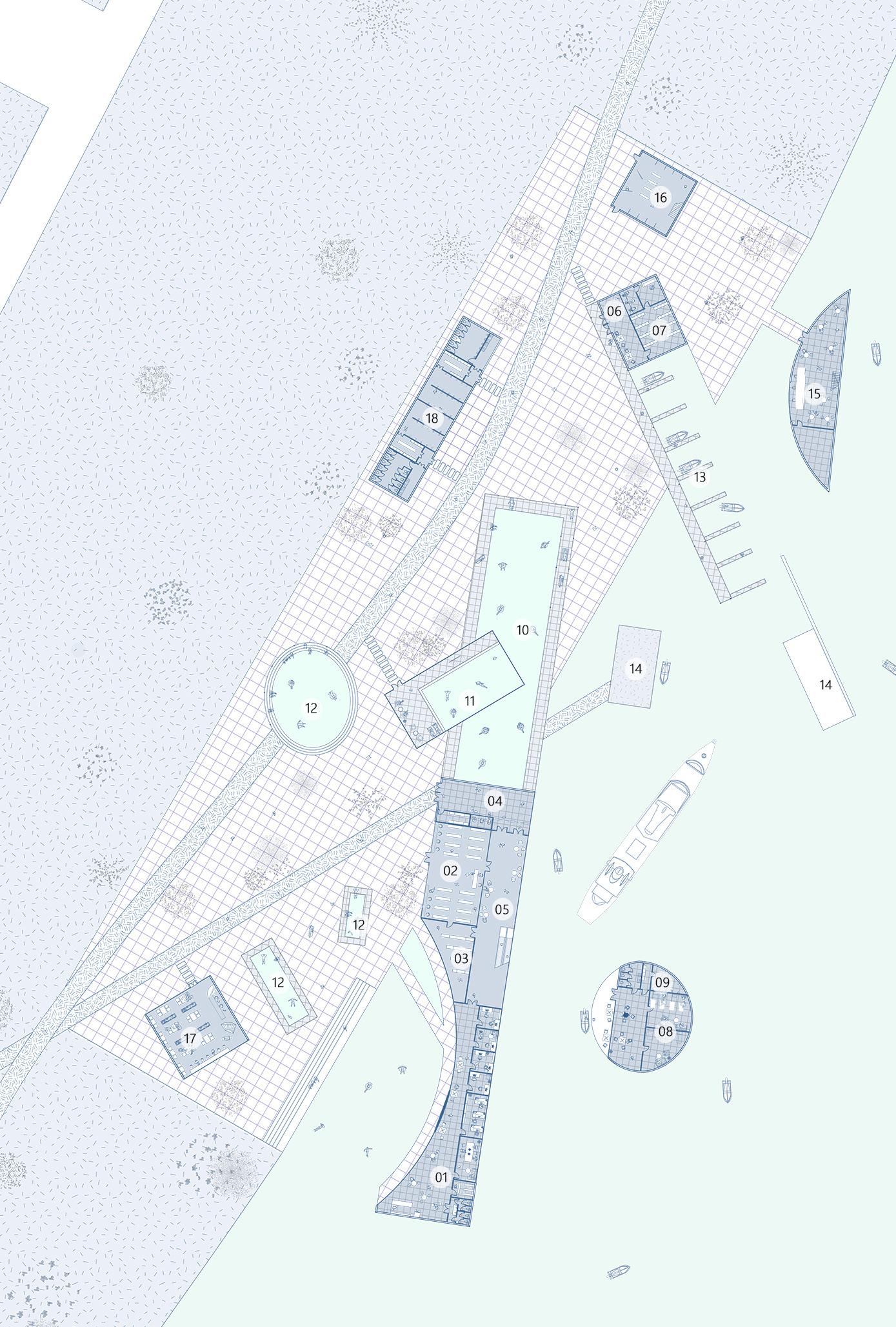

There are mainly three shapes in this scheme, which are used to meet the needs of different spaces. Based on the concept of "Falling Puzzle", buildings used by different people have shape correspondence.
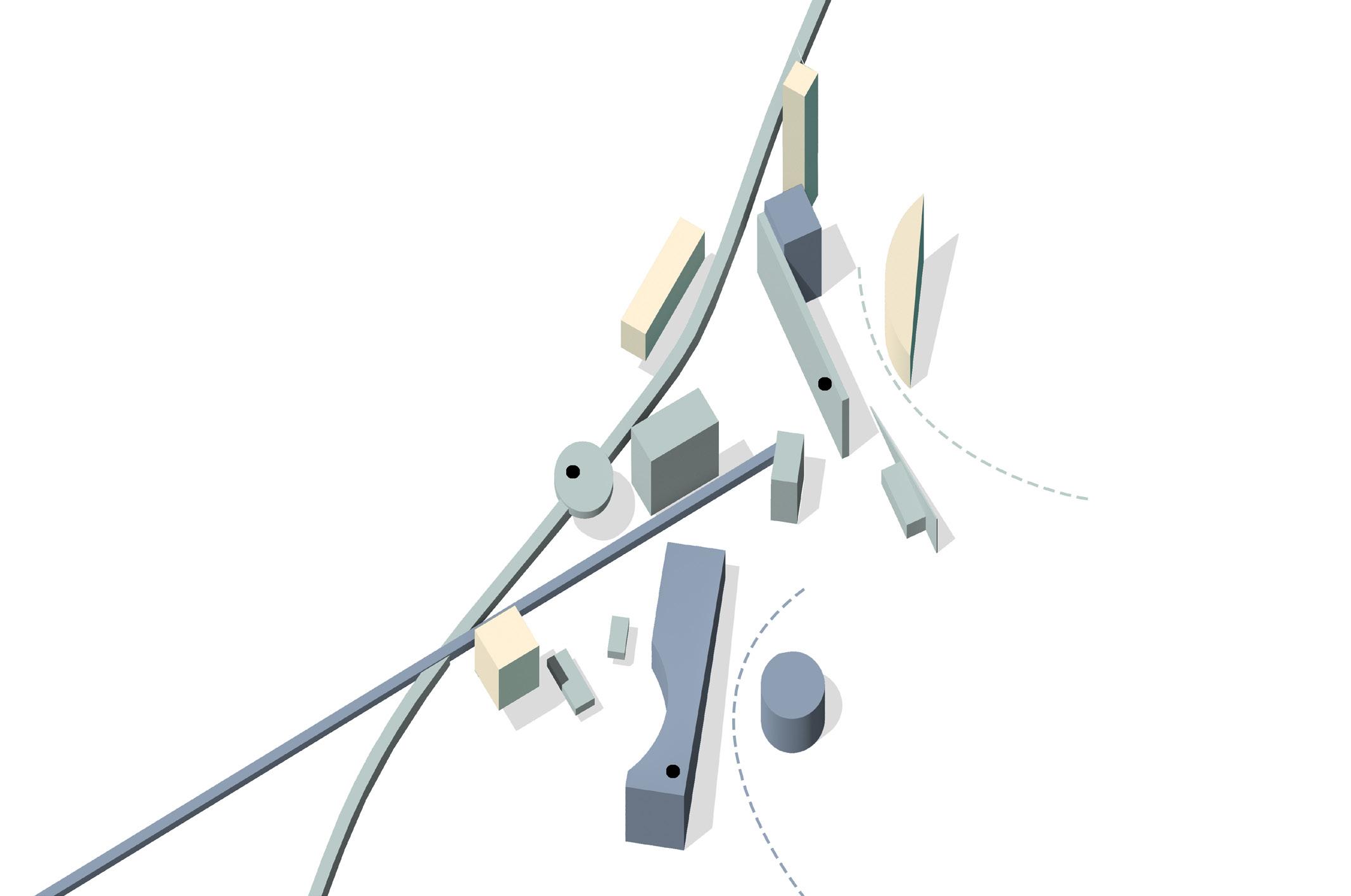
For work group
For local people
For all the people
Ferry terminal Sailor's lounge Dock office Boat pier Leisure bath Indoor bath Exhibition Coffee shop resturant
Ferry terminal Passengers can board here
Dock
Park the cruise ship
0m 5m 20m Ground Floor Plan Shape Ferry terminal: 01.Ferry Staff Office 02.shop 03.Storage room 04.Ticketing Hall 05.hall Dock office: 06.Cruise Ticket Hall 07.storage: Sailor’s lounge: 08.dormitory 09.Shower Bath: 10.swimming pool 11.Indoor bath 12.leisure bath 13.Dock 14.Island 15.Coffee shop 16.exhibition 17.resturant 18.lavatory Line Circle Square 04
Buildings and squares are open to all the people. The people in blue are workers, the people in green are locals.There are mainly three shapes in this scheme, which are used to meet the needs of different people. At the same time, ferries and cruise ships also run around the building, forming a part of the building.
am very happy to swim with my friends!
 Axonometric Diagram:People's Activity In The Building
Coffee shop
Ticket office
I’m tired after driving. I want to have a rest here.
It’s good to have coffee here!
I’m waiting to take the ferry to work.
It’s very comfortable to bask here.
The scenery here is so beautiful!
Boarding
Indoor bath
Sailor’s lounge
Swiming pool
Leisure bath
Resturant
Leisure bath
Lavatory Exhibiion
Axonometric Diagram:People's Activity In The Building
Coffee shop
Ticket office
I’m tired after driving. I want to have a rest here.
It’s good to have coffee here!
I’m waiting to take the ferry to work.
It’s very comfortable to bask here.
The scenery here is so beautiful!
Boarding
Indoor bath
Sailor’s lounge
Swiming pool
Leisure bath
Resturant
Leisure bath
Lavatory Exhibiion
05
Island Island
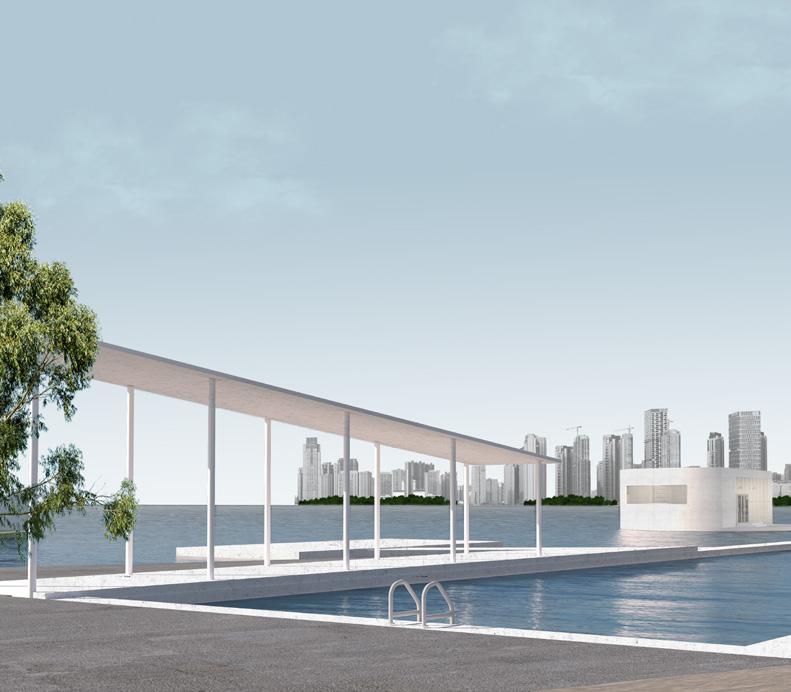


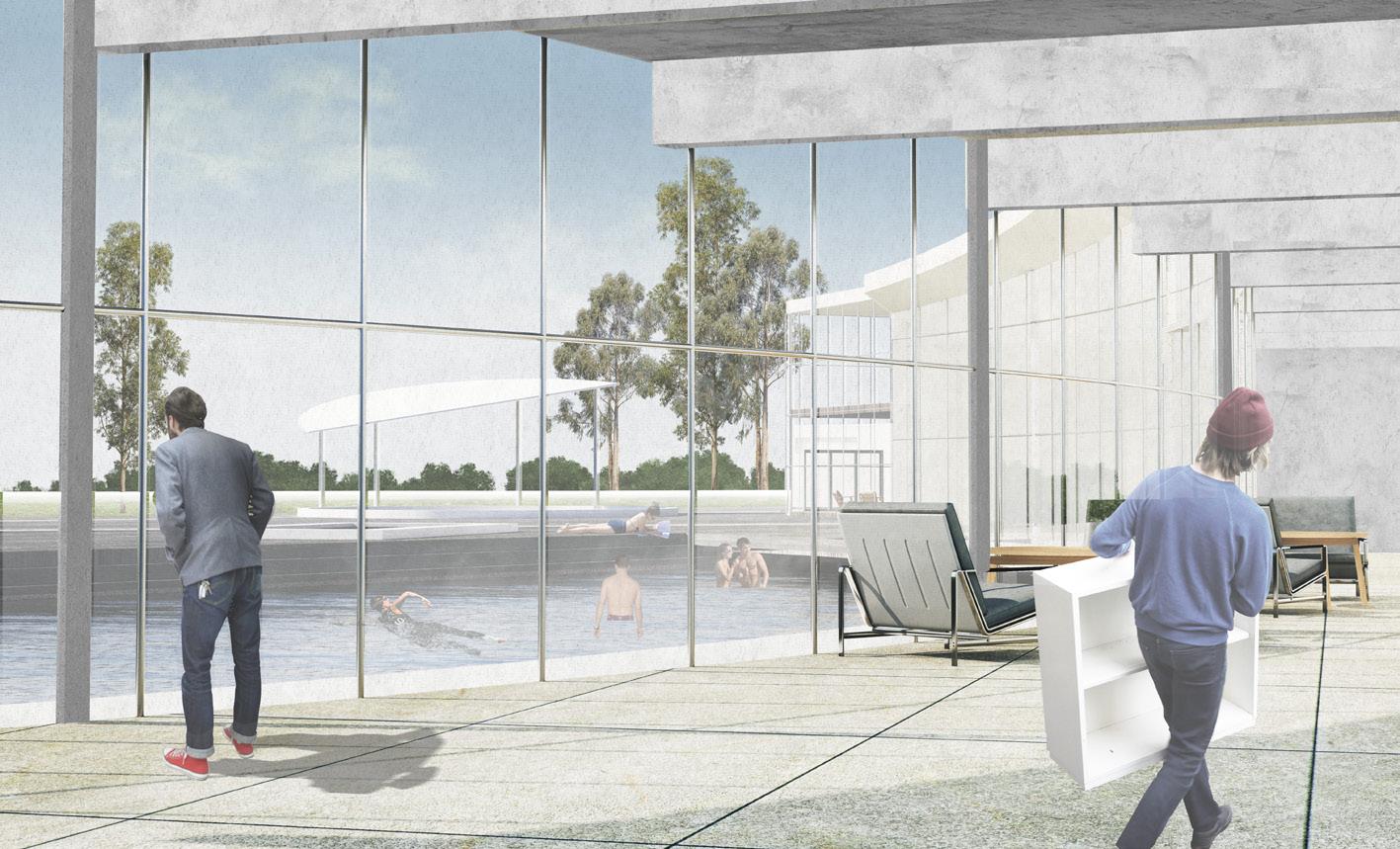
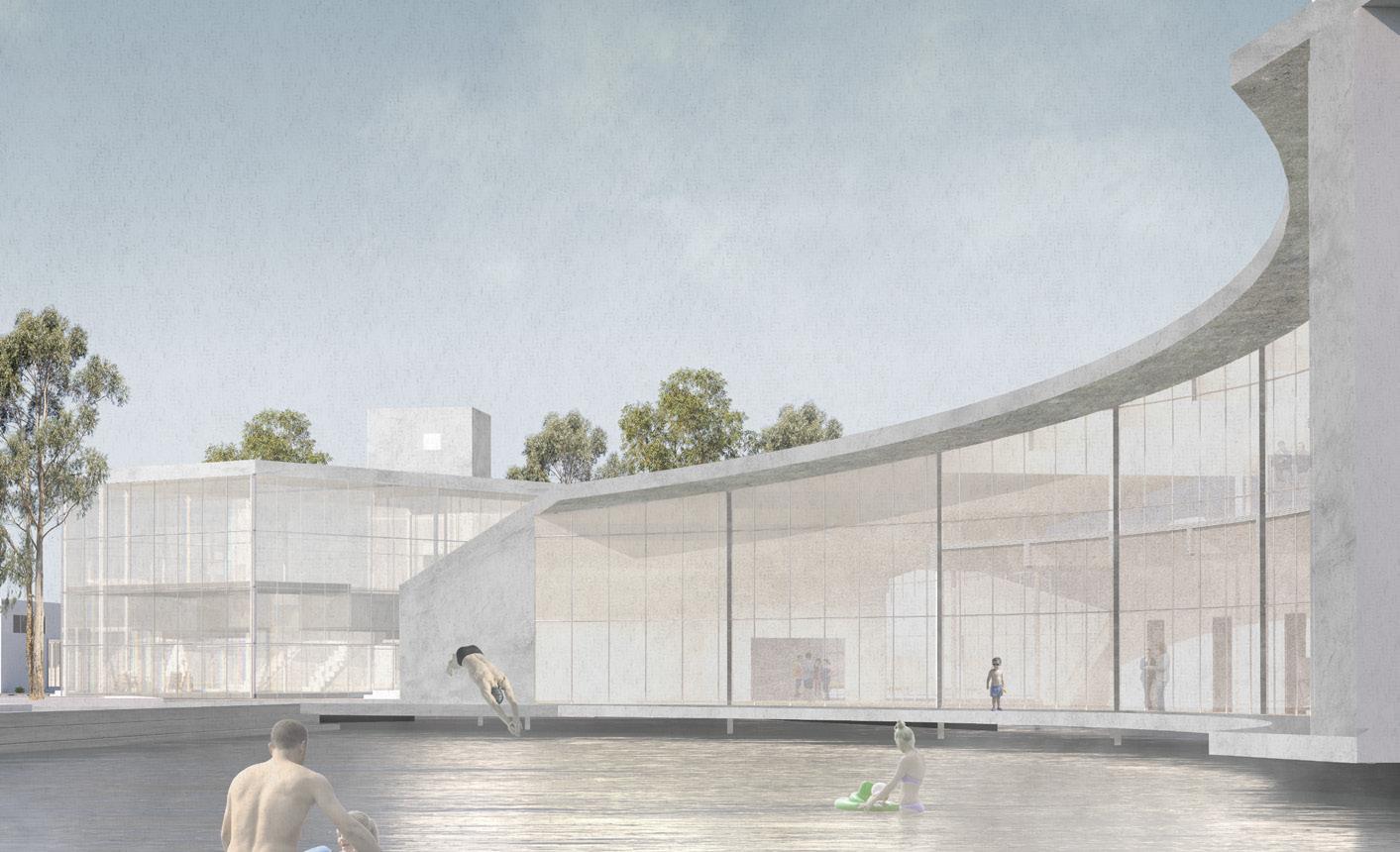

2.Sun
3.Coffee
4.Office
5.Bath
Terminal 06 Special Moments :Shape collision in Outdoor space 2 1 3 4 5
1.Lounge For Sailors&Coffee shop
Shelter&Lounge For Sailors
shop&Ferry terminal
Of Ferry Terminal
Outside The
Lounge For Sailors Store Waiting Room Cruise Area Leisure Bath A A’
Section A-A'
-02-
The Road To The West Theatre design based on historical stories of the Silk Road
Apr.-May. 2022
Individual Work
Location:Xinjiang ,China
Grade:4
Type: Academic work
Course Name:Architecture Design 6
Instructor: Huang Meng
Instructor’s Contact: hithm@126.com
The Silk Road is a treasure hunting road. As early as a few hundred years ago, eminent monk Xuanzang set foot on the Silk Road alone to seek Buddhist scriptures in India. Along the way, he encountered various hardships and also met many interesting things.
The site is located in a town of Xinjiang, China ,which is surrounded by a desert. It is also one of the most important sites of the Silk Road.
This design selects the story of Xuanzang's journey and create different spaces for people to experience Xuanzang's treasure hunting experience. People can wounding between nature and architecture, just like walking in the desert.

07
The silk road
A Long Way To Find The Treasure
The Silk Road originated in the Western Han Dynasty and reached its peak in the Tang Dynasty. Many different stories have been formed on the Silk Road. Xuanzang's journey to the west is a very important one.After this juorney Xuanzang brought the Buddhist scriptures from India to China.
Story Line: What happened on Xuanzang's journey
Xuanzang met many obstacles as well as many enthusiastic people on his journey to the west.


India
Xuanzang went to Nalando Temple, the most famous temple in Dharma Jietuo State, and devoted himself to cultivation.
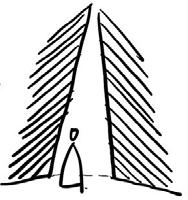
Pamirs
Pamirs is located in the plateau, with many snow mountains and harsh climate
Xinjiang(SITE)

Xinjiang located in northwest of China,and Surrounded by desert and plateau
Finding
Xuanzang decided to go west alone
Lost
The desert was heavily guarded.
Meet
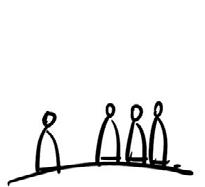
The king of Gaochang treated Xuanzang warmly.
Site AnalysisⅠ : A Town Surrounded By Desert

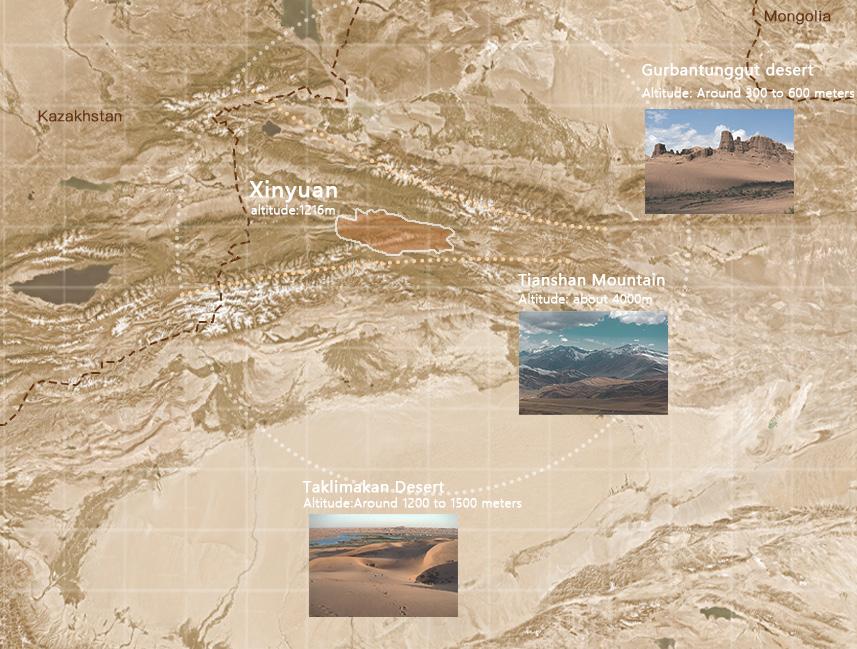
insight
The king of Shaye city escorted Xuanzang to India
hope

Pamirs Plateau had layers of snow mountains. But the destination is getting closer.
Destination he finally arrived at the Tianzhu Holy Land.
The base is located in Xinyuan County, Xinjiang, and it is an important stop of the Silk Road. Xinyuan County is surrounded by deserts and mountains.
Dunhuang
Dunhuang is also located in a desert,It is said that there are many immortals there
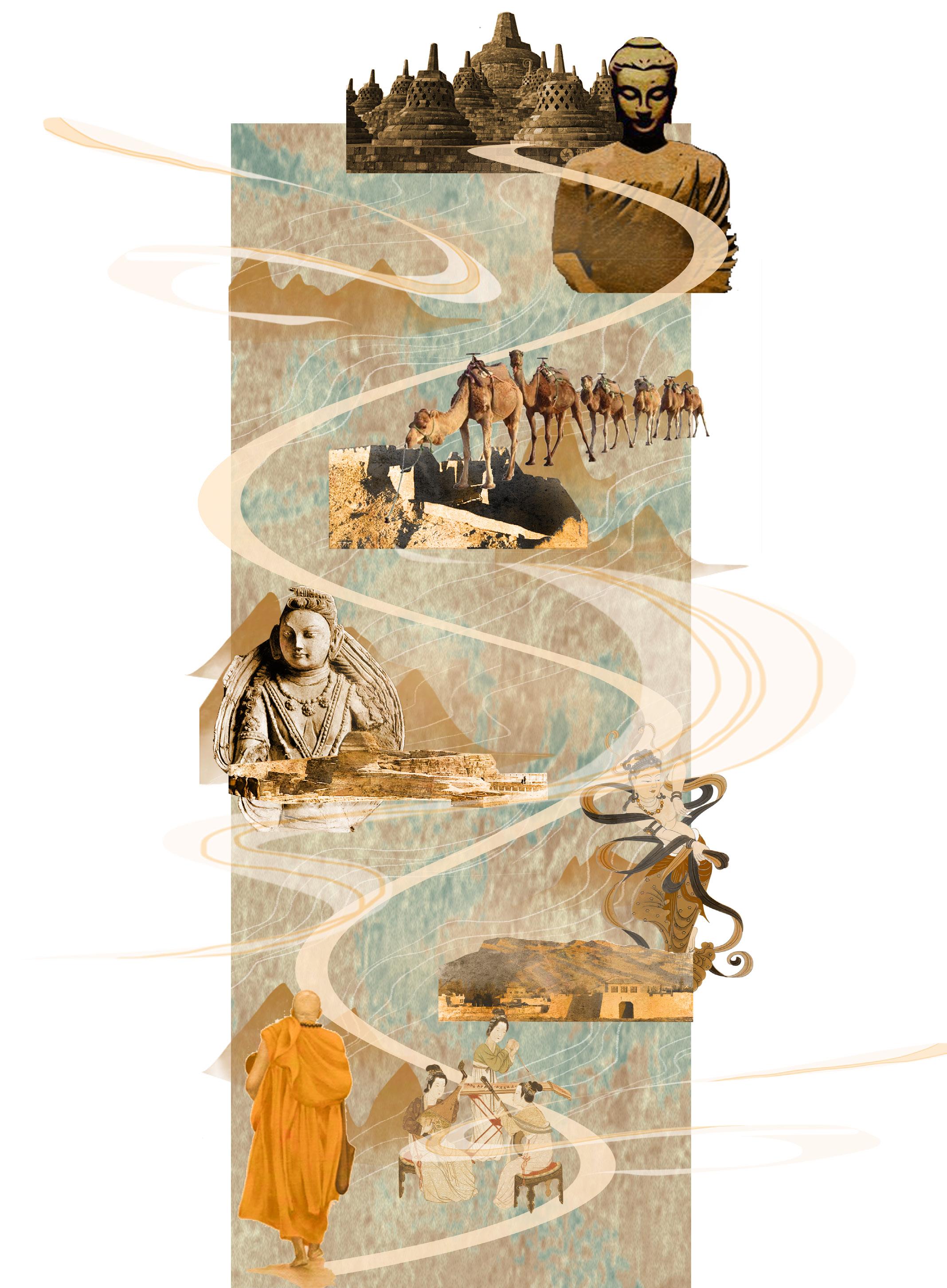
Liangzhou
Liangzhou is located in a desert,The weather here is bad and the population is sparse.
Changan
in 629, Xuanzang decided to go to India to study Buddhism.
天竺
新疆 帕米尔
敦煌
凉州 长安
08
Site Analysis Ⅱ:Analysis Of Surroundings
The site is located in the corner of Xinyuan County, to the north of it there is lake. There are many houses around the site.
Surrounding Buildings Analysis
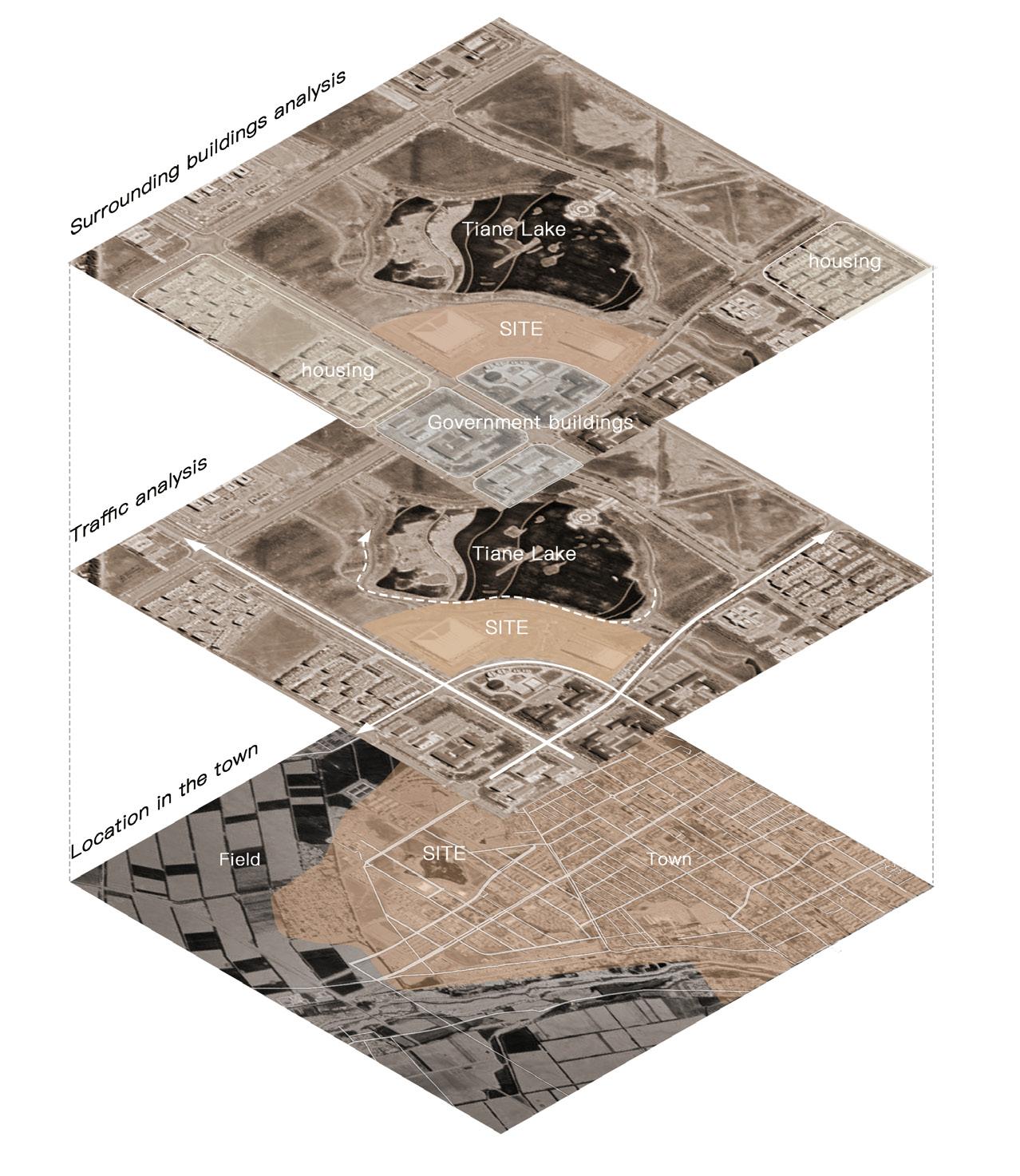
The surrounding buildings are mainly residential buildings and public buildings.
Form Developement
This design is based on the concept of the Silk Road, and adopts a continuous form, as if it is a road going through the desert.



Traffic Analysis
There is a small lake called Tiane Lake around the site. There are two traffic arteries, a two lane highway and a pedestrian path nearby
Cultural Analysis:
Xinjiang has many nationalities living together, forming a unique composite culture.

Location In The Town
The site is located at the corner of Xinyuan County .
1.Determine the building trend according to the site shape and pedestrian.
2.Reduce the building volume and create two roads leading to the lake.

3.Create accessible roofs and semi underground courtyards.
4.Create skylight to introduce natural light.
Local Architecture Analysis:
The local buildings in Xinjiang are mainly made of sand and stone,some of them are built in the ground or on the hill. In addition, there are felt houses with nomadic characteristics.

Uygur ethnic group Local
Nomads
Gaochang
Xinjiang
felt houses Grotto
ancient
the hill ancient
Religious architecture Grand
folk music
in the desert Grotto murals
Ancient Kingdom Kazak ethnic group
dance
architecture
buildings on
buildings made of soil ancient buildings
made of soil
Bazaar made by stone
9






01Auditorium 02.Lounge 03.Small Theatre 04.Meal 05. Multi-functional Exhibition 06. Xinjiang Culture Exhibition 07. Medium Theatre 08.Lounge 09.Dressing Room Un derground Floor Plan 0m 5m 20m 10.Storage room 11.Waiting room 12.Lighting control room 13.Projection room 14.Instrument storage room 15.Equipment room Ground Floor Plan 10 20m 02.Lounge 06. Xinjiang Culture Exhibition 16.The second floor of the auditorium 17.Storage room 18.office 19.rehearsal room Function annotation Function annotation 0m 5m
Outdoor Space: Walking between nature and architecture





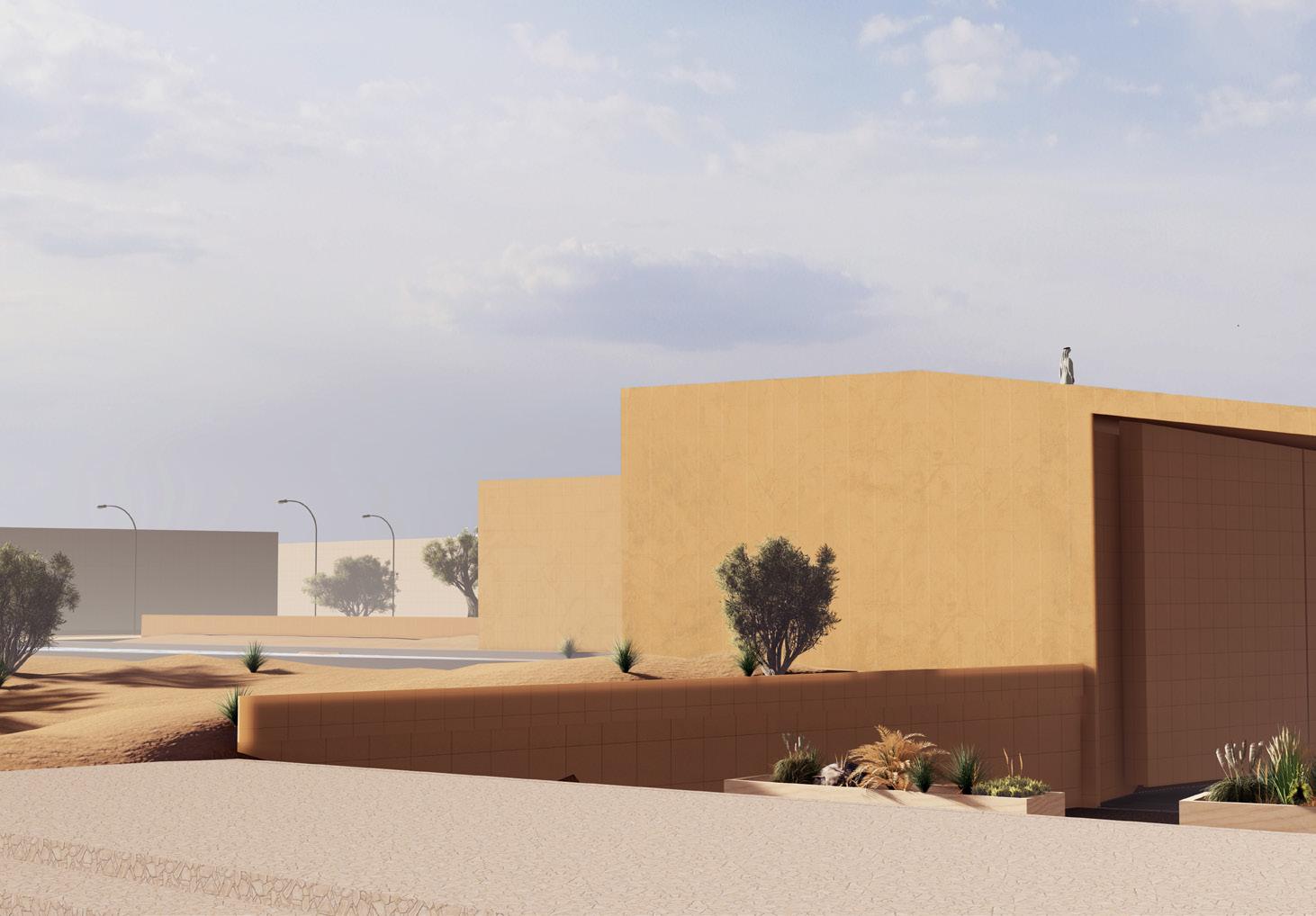
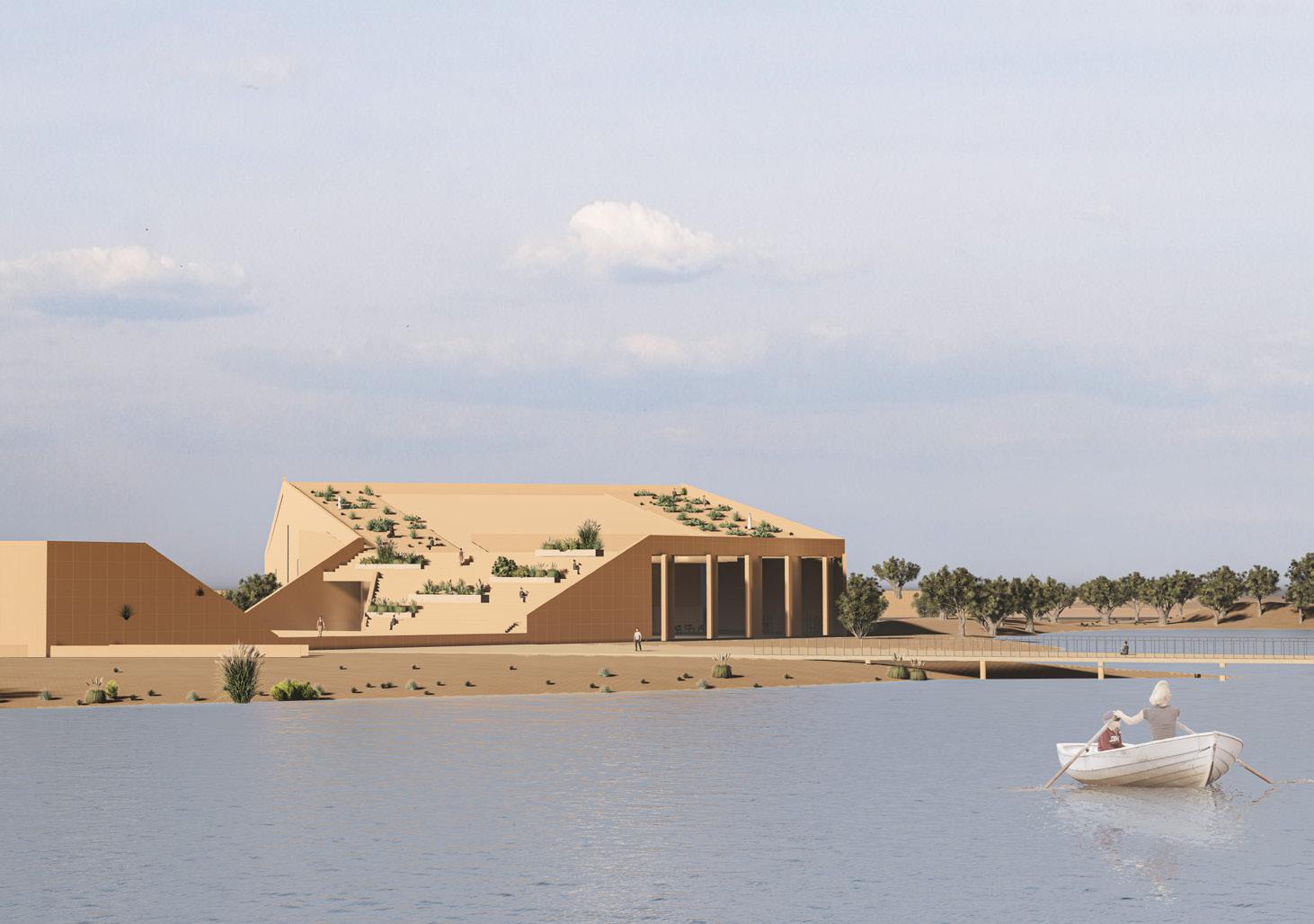 SectionA-A'
SectionB-B'
SectionA-A'
SectionB-B'
Roof & Hydrophilic Platform Courtyard Courtyard Courtyard Hydrophilic Platform Courtyard Accessible Roof Courtyard 11 A’ A B’ B Accessible Roof
Accessible
Indoor Space: Going back to Xuanzang's journey to the west
The building has multiple circulations and multiple exits to the outside. Sometimes the roof, ground and indoor ground will intersect, allowing people to freely cross between indoor and outdoor. At the same time, people can feel different emotions through changes in light, shadow and space



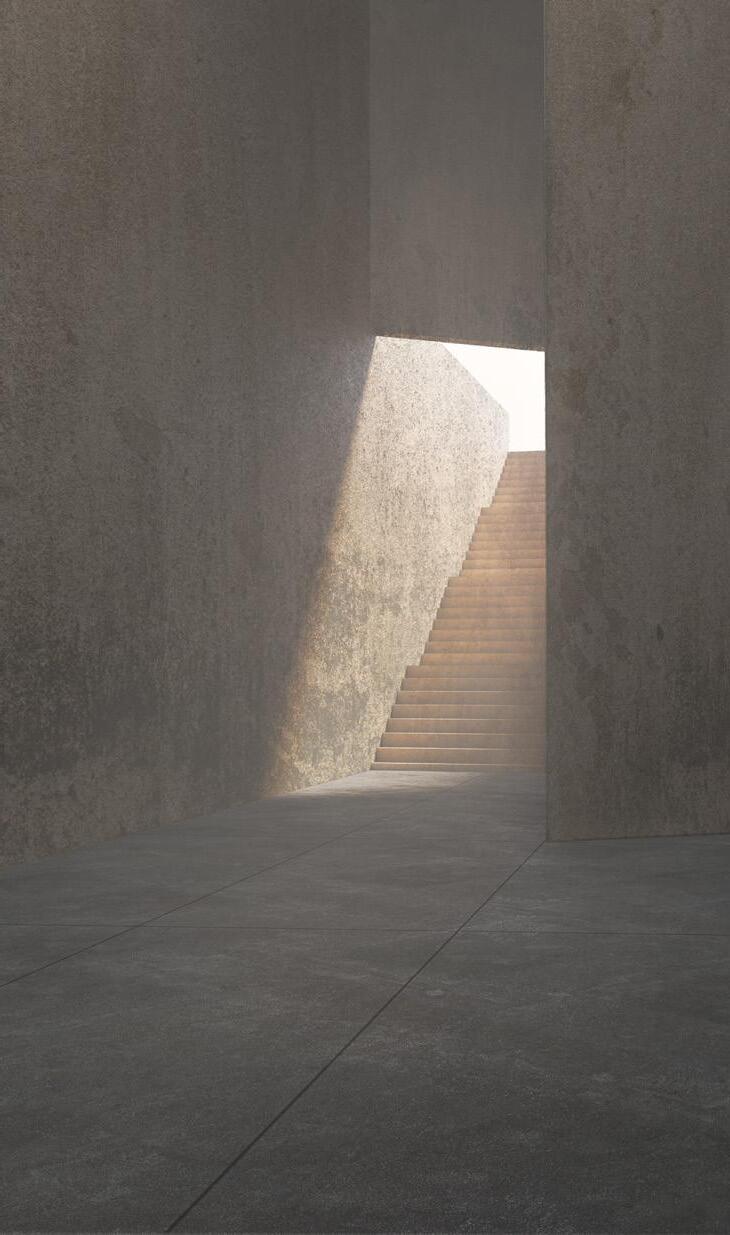


Moving forward, there is a well lit and open hall ahead, which is the destination of the journey.


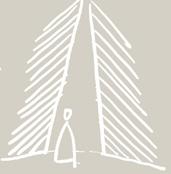
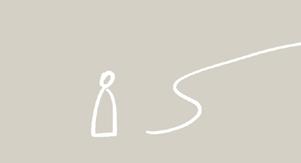

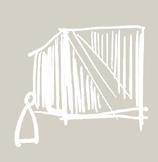
Walking from the bright hall to the underground, the dark space makes us feel lost, but the light gives the hope.
Out of the small theater, the vision becomes wider, and the bright light and the rising stairs lead you to move on.

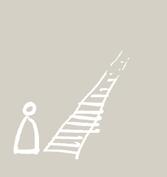
Entering through the side door, there is a bright room where many people gather to watch the performance
Keep moving, the road ahead is becoming crowded, and you can see some light in the distance.
The main entrance of the building, through which you can start to experience the way of treasure hunting
Destination Theater Lounge Hope Entrance Lobby Accessible Roof Lounge Theater Auditorium SectionC-C' Insight Hope Destination Finding Lost Meet insight Corridor Meet Medium Theater Finding Entrance Lobby Lost Lobby
12 Entrance Lobby Medium theater C’ C
-03-
Galaxy Office
Super high-rise design of office space in the future
Oct.-Dec. 2021
Individual Work
Location: Shanghai,China

Grade: 4
Type: Academic work
Course Name: Architecture Design 5
Instructor: Yu Ge
Instructor’s Contact: yuge_hit@yeah.net
Floating boxes
In recent years, the office has become the most frequently used space for people,but the office space now has many drawbacks. The digital information age has put forward more requirements for office space. People are no longer satisfied with boring office space. However, they need more leisure space and shared space.
In this design, I put the floating box into the high-rise office building as a large public space, trying to weaken the space of "work" in the office building, so that more interesting events can occur in the office. This office is more like a free community.
At the same time, these boxes and some scattered columns constitute the structural system of the building together, replacing the traditional frame structure, making the standard floors become column free spaces for free layout, breaking the boundaries between layers.
13
Evolution Of Office Building: What was the office like over years

With the change of production mode, office building space is constantly changing. IIn 1900, intensive office space was the most popular. However, today's office space is more flexible.
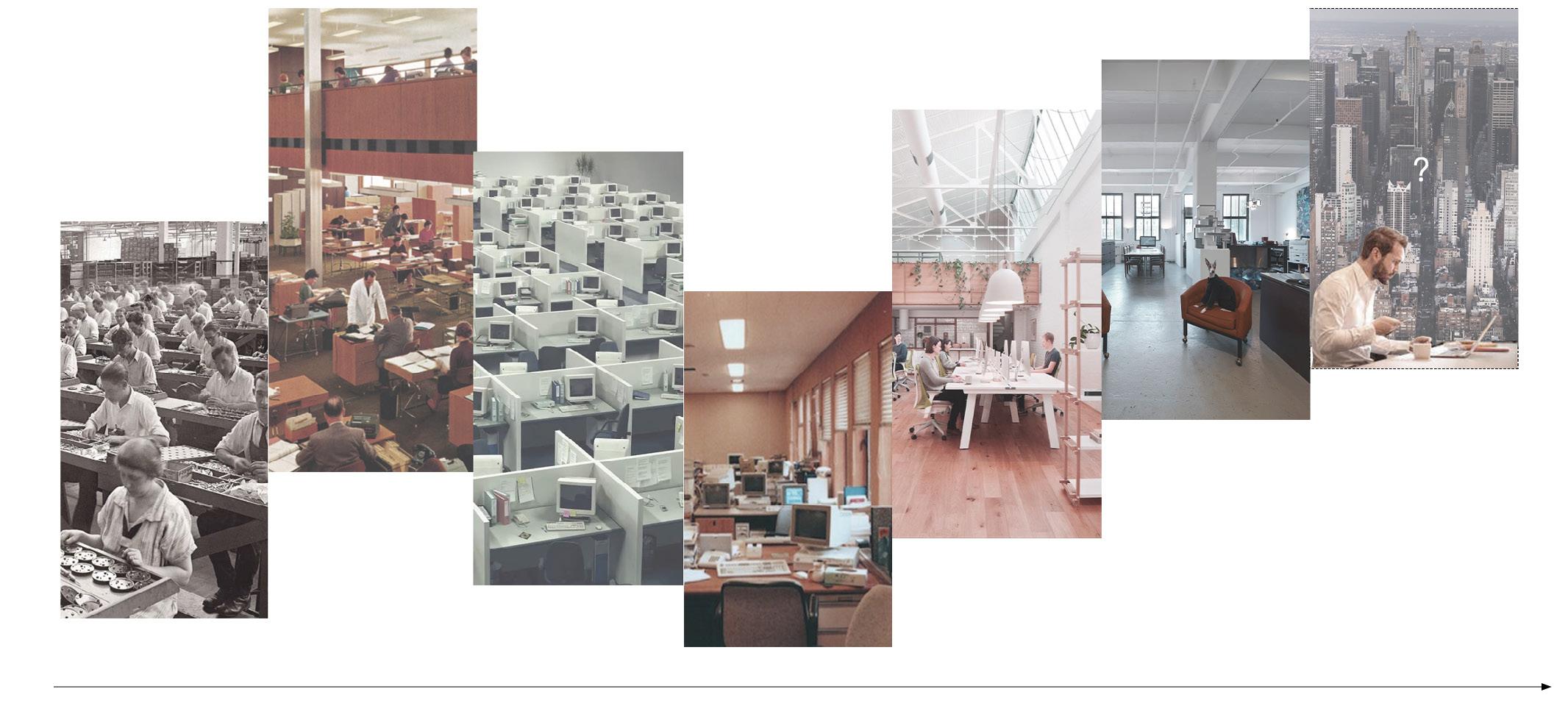
1950
In the 1950s, the office advocated open and non partitioned office space, and all office furniture could be flexibly combined 1960
1900
The typical office environment is full of hierarchical and impersonal colors, and standardized desks will be intensively placed in open areas
The whole office space is effectively and perfectly managed by modular and grid space design.
2010
The digital era has ushered in a new style of office that sees homely designs (even including beds, occasionally) mixed with excursions into sheer grandeur in order to have workers feeling comfortable
Site Analysis: Diverse Office Population


2020
Under the influence of the COVID-19 in 2020, many office workers began to work at home, and the office environment seemed more free and diverse
1990
Co-workers wanted to become more integrated, and so a more sociable office layout was put into play.
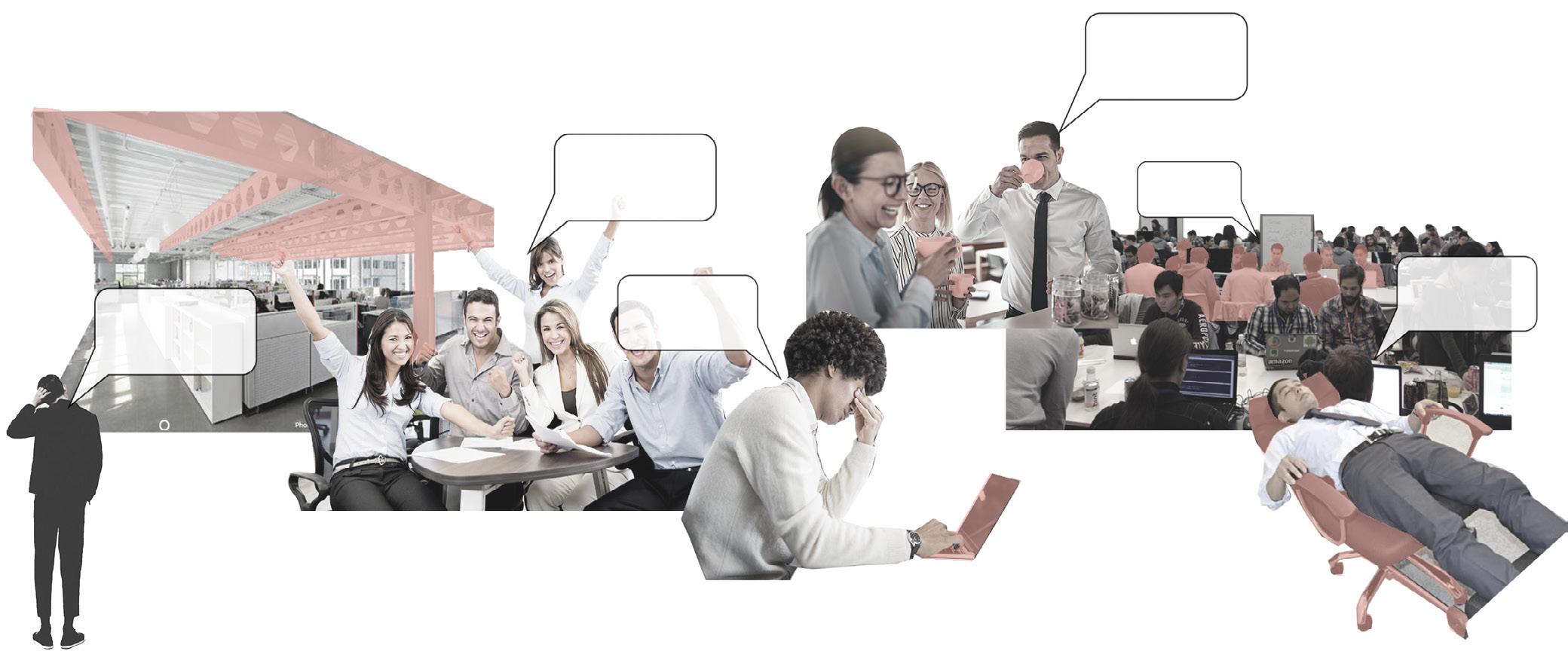
Future
With the improvement of production efficiency, office workers have more free time. The new office space should be more flexible.
Shanghai is a city with a large number of young population. People working in a wide variety of jobs such as Technology jobs, media jobs and art design jobs. The site is located in Pudong New Area, Shanghai, with many office buildings around.
Proportion of different occupations:

43% 38% 15%
43% of young people work in technology companies.
For Future Office Space: Flexibility, Entertainment And Sharing
The

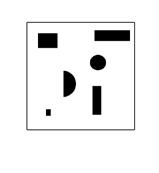
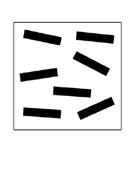

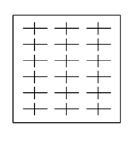

Overcrowded office space makes office workers have no privacy, and the new office building needs more open space.
39% of young people work for media companies.
15% of young people work for design companies.
Concept: Floating Public Space
Office buildings within a five kilometre radius of the site
Inspired by the galax, I want to insert some boxes into the building as a large space for public activities. At the same time, these boxes will work together with the columns as the structure for the building, creating flexible spaces without column frames.
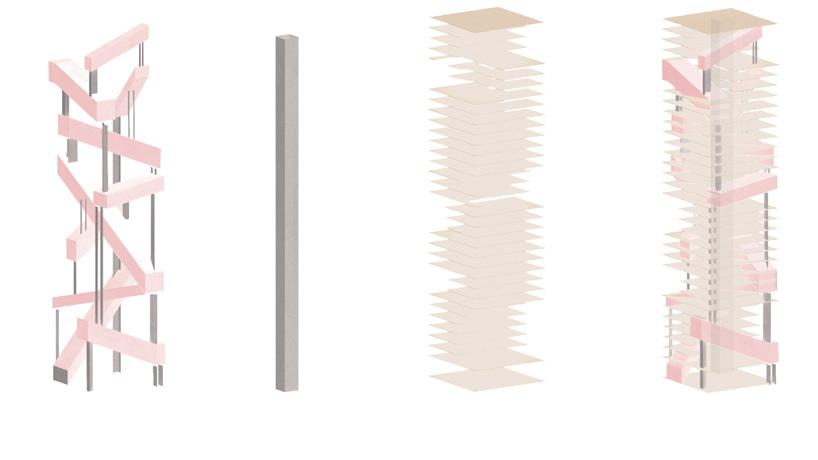
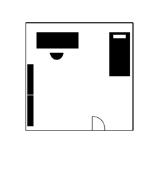
STEP1: put public places into boxes
Museum
Traditional office buildings generally lack rest space, and new office buildings need more rest space for office workers.
+
STEP3: Placed in boxes as public space
Put different public space into boxes according to the tilt angles public space office space 14
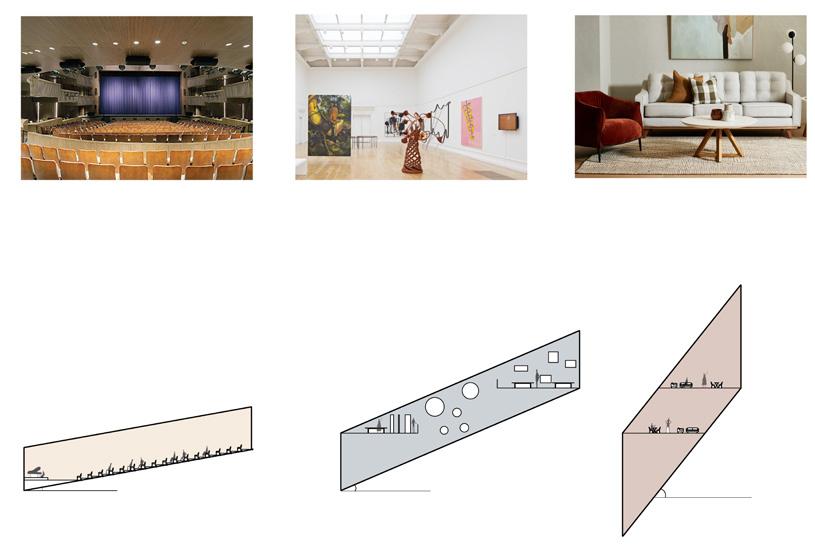
Intensive Office Open Office Cubicle Office Co-working Space Diversified Office Work At Home New Office Traditional structure is boring! We want to work together! need some relaxation want to make friends It’s too crowded want some space for rest
New Structure Diverse Workers More Leisure Space Social Opportunities More Rest Space More Spacious
the future,
the improvement of production efficiency, office workers need more leisure places to relax.
New Demand
The traditional structure depresses the monotony of the office, and new structures are needed to break the barriers between layers
In
office work will become more cooperative, and people of different occupations can work together With
new office needs to meet the social needs of office workers,
that the
ation between
will be more harmo-
so
cooper-
workers
nious.
15° 30° 60°
STEP2: Combine the box and column as structure SITE
Theater Lounge use boxes as “beam” put in some columns structure
+ Traffic space galaxy office
Function Analysis of public spaces


The large spaces formed by the boxes can carry different functions, such as gyms, libraries, pavilions. The boxes and the columns form the structure of the high-rise building together.




Exhibition
The exhibition can be used to display some of the design company’s artwork.
Library
There are leisure books and professional books in the library for office workers to read.
Leisure Space Cinema Theater
Resturant
Used as staff canteen or communal kitchen.
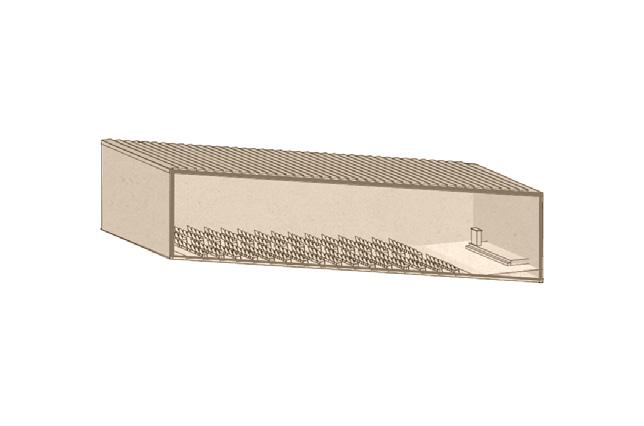

Leisure Space
The leisure space is composed of different small spaces, which can be used as the rest room, video room, etc
Auditorium
The Auditorium can be used for hold press conferences or large conferences.
Leisure Space
Gym
The gym can be used for sports with small space requirements like table tennis and running.
15
Plan Of Different Functions: Commercial Space And Different Office Spaces
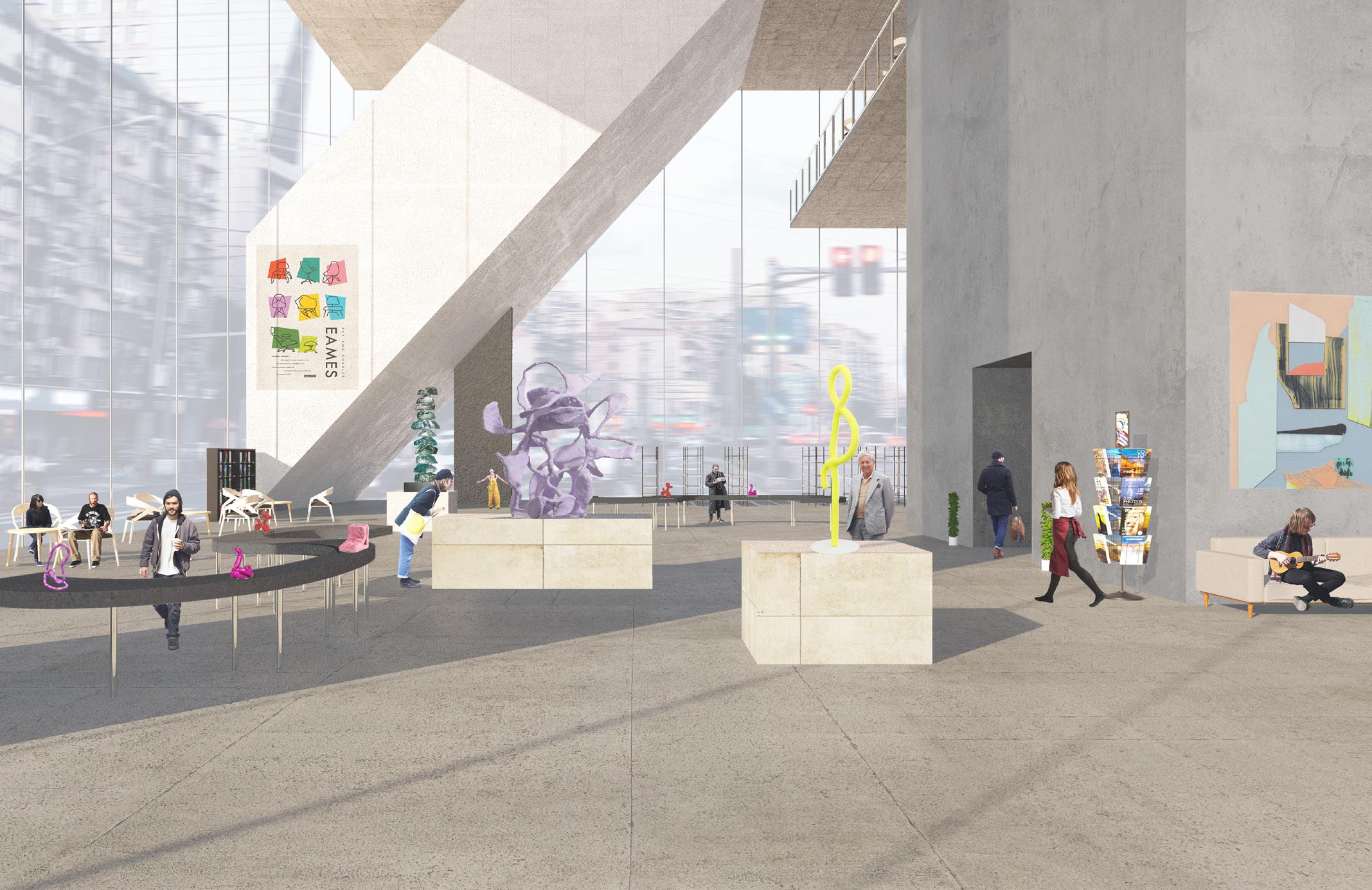
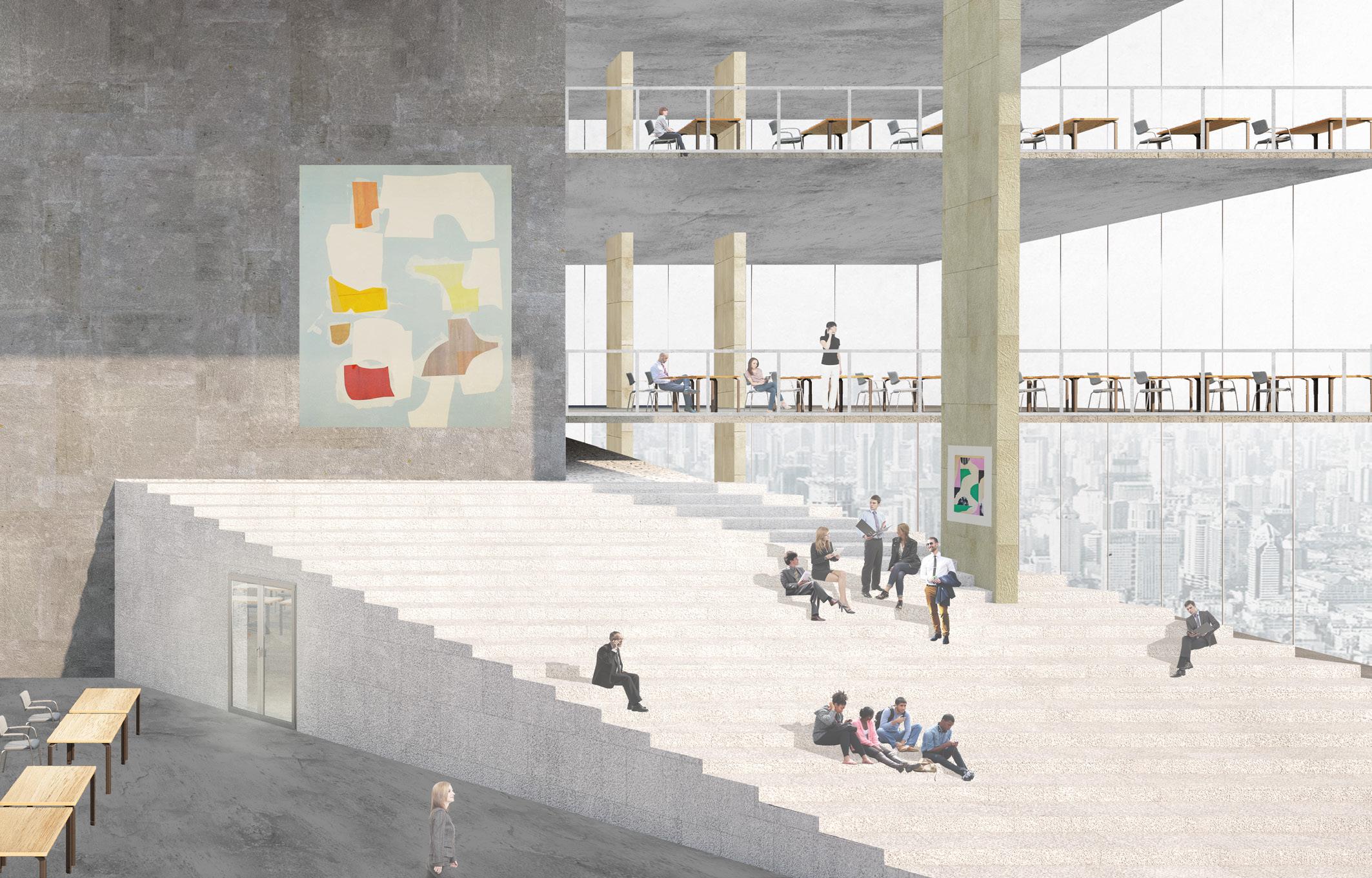




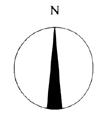


The building has four main functions, namely the first floor commercial space and exhibition space,media office,technology office and design office

01.Entrance 02.Information 03.Locker 04.Cashier 05.Exhibition 06.Store 07.Core-tube 01.Leisure cinema 02.theater 03.Meeting room 04.Open office area 05.Core-tube 0m 2.5m 10m 0m 2.5m 10m 4f Plan:Media Office Ground Plan: Commercial Space&Exhibition Commercial Spaces: f1-f2
8f
interior space:
Media Office: f3-f12
Plan : Open Stairstep
16
1f Plan : Exhibition
The first floor is open to the public, and some exhibitions and sales can be held.
Ladder space can be used for office staff to rest and discuss

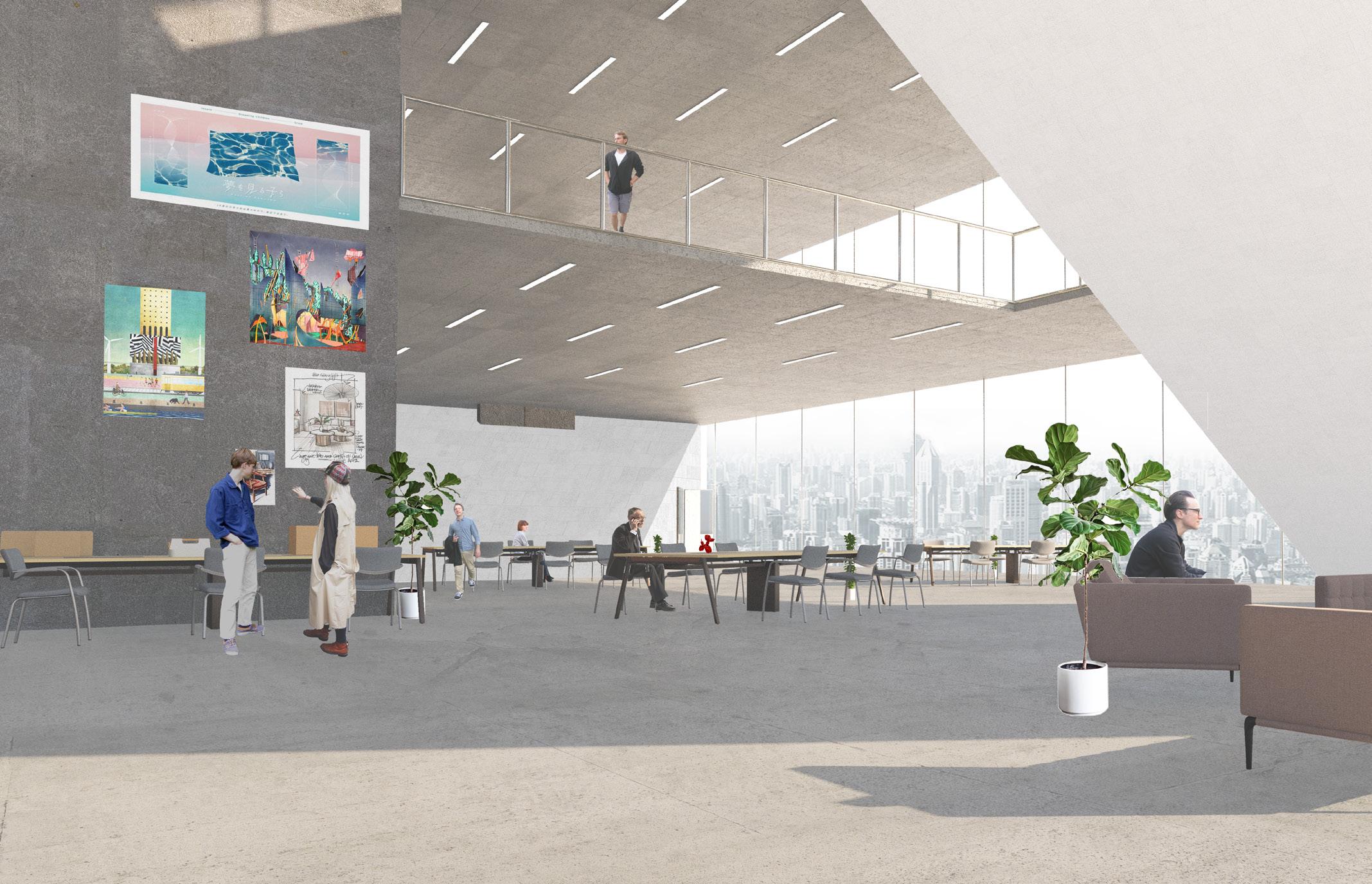





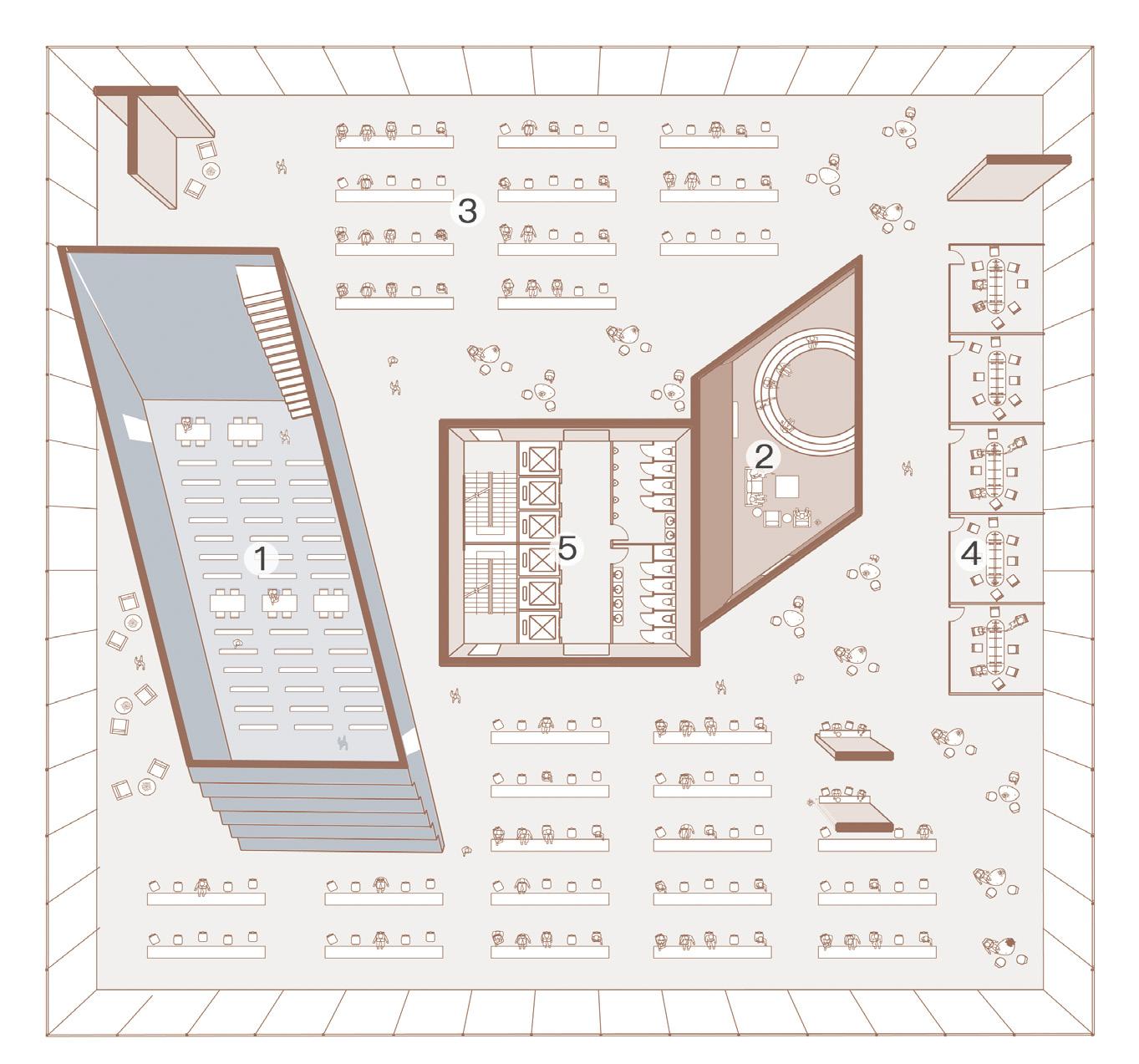

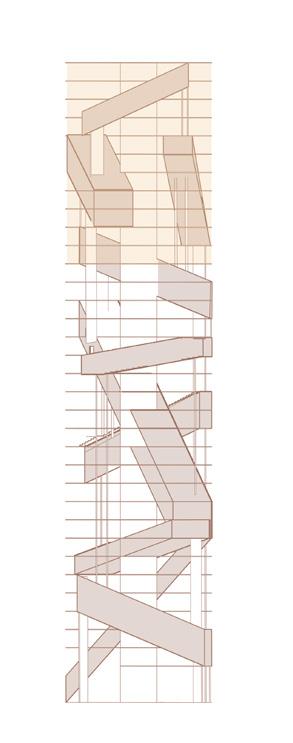 19f Plan: Technology Office Stairs connect different floors, allowing people to communicate freely.Workers can enter the leisure room near by.
21f Plan: Design Office Designers can communicate freely on the long table and easily enter the exhibition space.
19f Plan: Technology Office Stairs connect different floors, allowing people to communicate freely.Workers can enter the leisure room near by.
21f Plan: Design Office Designers can communicate freely on the long table and easily enter the exhibition space.
01.Library 02.Entertainment Room 03.Open office area 04.Meeting room 0m 2.5m 10m 01.Exhibition 02.Cafe 03.Team office area 04.Open office area 05.Core-tube 0m 2.5m 10m
interior space: Plan of standard floor:Different office modes with no column
13f Plan:Technology Office
27f Plan:Design Office
Technology Office: f13-f23
17
Design Office: f23-f33
Space in the box: Activity Space With Different Functions

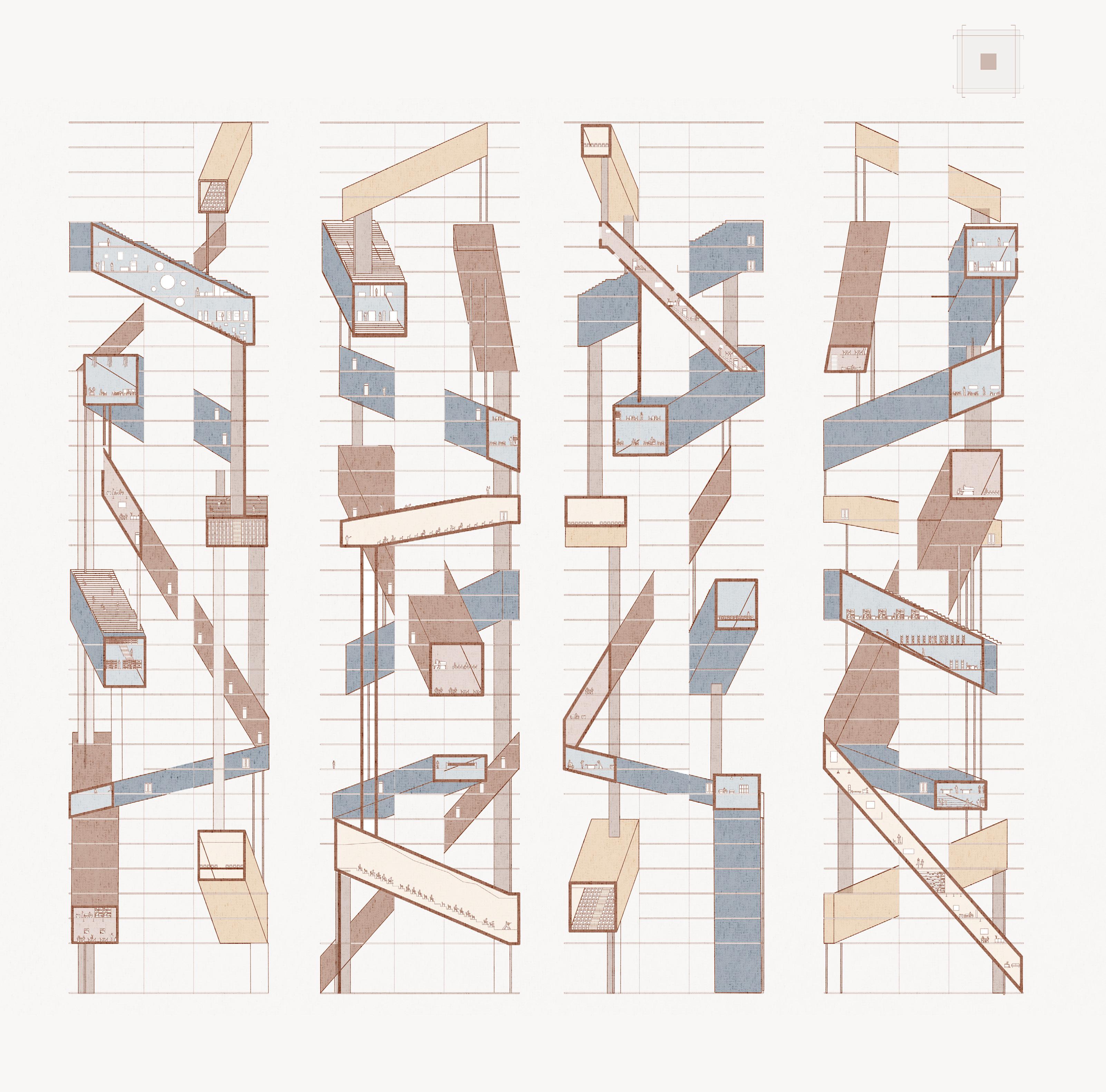
There are mainly three kinds of public spaces in the boxes: lounge, auditorium and leisure space.






resturant exhibition library theater report report gym lounge resturant
Section A-A' Section B-B' Section C-C'
theater lounge exhibition library
Lounge Exhibition
exhibition resturant lounge 18 B B’ C’ C A A’ D D’
Section D-D'
Theater
-04Live Like Bees
Youth entrepreneurship community
Jun.-Aug. 2021
Group Work
Location: Shen zhen ,China
Grade:3
Type: Academic work
Other members:
Hu yang, Ding wenzhuo, Zhou jingchun
My role: Team member
My contribution: Design: 60%, drawing:100%
Instructor: Ye yang, Sun cheng
Instructor’s Contact: yeyang@hit.edu.cn
Co-lIving group
In China, many big cities are facing a serious housing crisis. Every year, a large number of young people come to work in Shenzhen, China, resulting in an increasingly serious housing shortage. In Shenzhen, the average housing area of people is only 35㎡, while the price of houses in the city has reached 100000 yuan per square meter.
At the same time, Shenzhen is a city of entrepreneurship, with the number of entrepreneurs ranking first in China. In this case, I would like to design an entrepreneurial community for young people. In the form of modular buildings, young people can freely customize their living and entrepreneurial spaces.
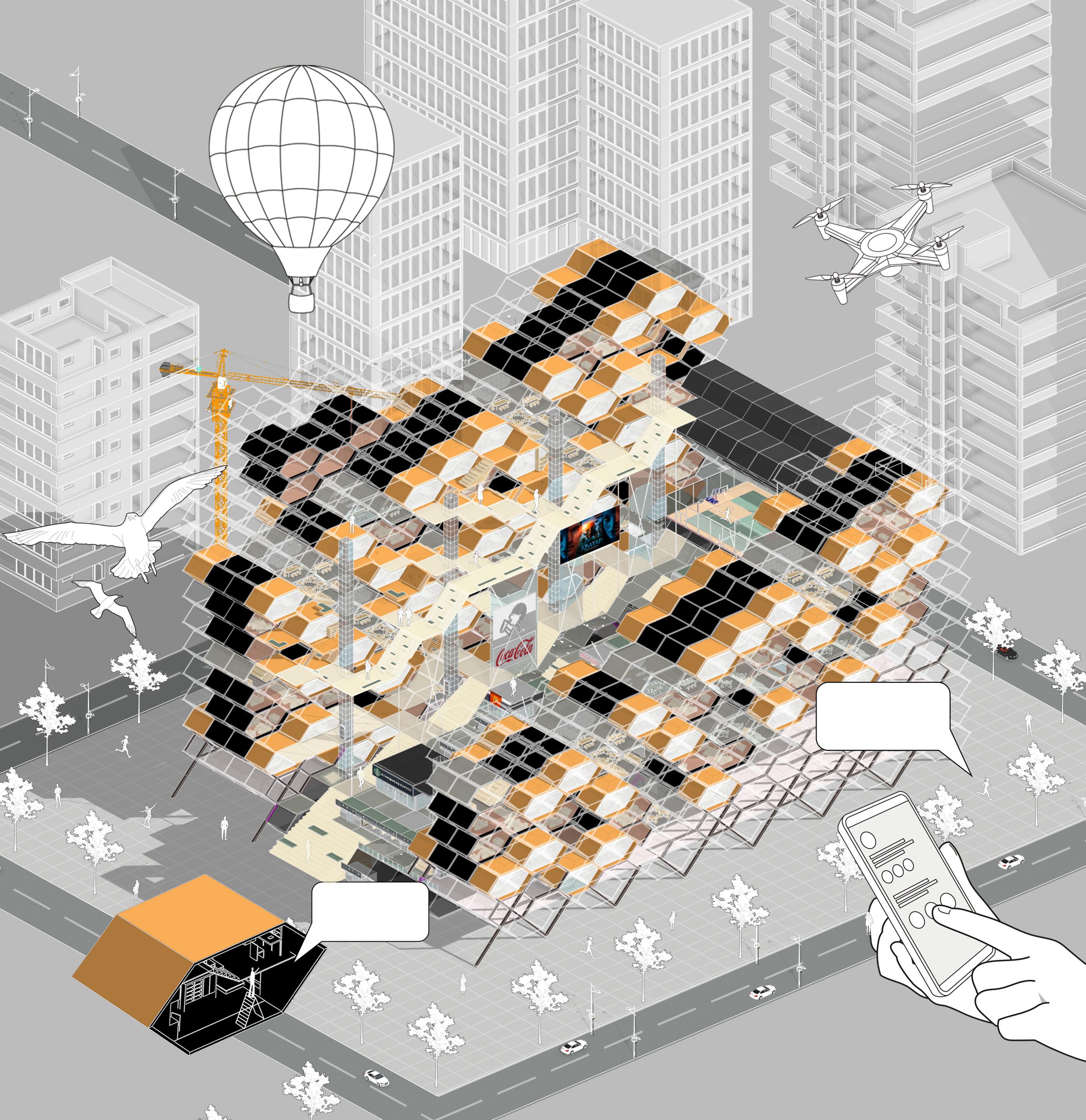
do it!
the living module now!
Let’s
Book
19
Background analysis: living condition of young people
A large number of young people come to cities to look for job opportunities. The cities become very crowded, which aggravates the problem. housing shortage
the average per capita living spacein big cities
Housing difficulties in Shenzhen
Urban Villages
Most of theUrban Villages were built in the 1990s, with an area of about 30 ㎡. The lighting is very poor, lacking open space
High priced houses in urban areas
Site Analysis: Entrepreneurial tendency
Beijing 33.41㎡ Small rented house
Youth Population expansion Rental
Feel lonely live a stressful life
Shanghai 32.28㎡ Long commuting time
A large number of young people flock to cities to seek employment opportunities, causing population inflation and increasing pressure on young people.
The house price in the city is very high, reaching 100000 yuan per square meter.
Most of young people live in the old rental house or Mini apartment in Shenzhen.
Shenzhen University
Southern University
Chinese Academy of Sciences
Peking University(Shenzhen)
Harbin Institute of Technology(Shenzhen)
Co-livingGroup: entrepreneurial community
Typology two-dimensional two-dimensional three-dimensional


Difficult to use space, resulting in waste.
Mini apartment
ten thousand
City Of Entrepreneurship!
Proportion of New company:28.9%
Proportion of entrepreneurs:13%
The “quadrangle” is a traditional Chinese residential form, which consists of the central public area and the surrounding private areas.

Weak connectivity between oblique cells. Sloping sides can be used as traffic space,different cells are connected more closely. private public




From the prototype of the quadrangle, we extract the co-living form.

Development:
Step1: Distinguish public and private space according to typology, Place public space in the middle of the site.
Step2: Cut off the building on one side according to the lighting demand. Put in some removable module.
Step3: Place traffic space to connect different living groups, and put leisure pedestrian street in public areas
private
group
Leisure
Basic Module: three kinds of cells

4m 5m
A.private module B.public module C.Connection
triple double quadruple fivefold
w
two-dimensional
three-dimensional
features w Number of new enterprises in each city in 2020(ten thousand)
house
The average capita housing area in Shenzhen is about 35 square meters. The housing ownership rate of the permanent residents is only about 23%, and more than 70% of the citizens need to rent. High priced houses in urban areas Shenzhen 35㎡ Average 20㎡ 100K/㎡
A crowded city!
The site is located near the university town, with a strong entrepreneurial atmosphere and a large number of young graduates
Orderings:
module
The basic unit can be combined in two-dimensional and three-dimensional as required to form different indoor spaces and outdoor activity spaces.
public private private public
co-living
street Removable module Step1 Step2 Step3 Removable module co-living group sunlight public private group public 20 outdoor space Semi outdoor space I’m lonely There is no sunshine in my room want some social space.
pedestrian
Combinations Analysis: Form of different groups
The modules of different combination modes can form a “work & life” group through three-dimensional superposition.

Special Moments: Activity of people
Designers can communicate freely on the long table and easily enter the exhibition space.

Combinations Analysis: Splicing different groups together
Different groups can be connected together by the connect module. Staggered modules will form outdoor activity space and traffic space



A.Private module B.Public module C.Connection module D.Group 2A 3A 3A 8B 14B 22B 2C 8C 8C living function *4 *4 *6 *8 *10 *12 *2 *4 *4 *4 *4 cinema living room kitchen study gym living room living room kitchen study living room shared leisure area meeting room meeting room shared leisure area shared leisure area 2A+8B:E-commerce studio 8A+14B:Animation studio 12A+14B:Design studio adding private module on the public module,people can go into the share places by living function module. private module can be connected together by different ways. office function living function office function
D: Group1: 2A+8B D: Group2: 8A+14B D: Group2: 12A+14B 8C 8C 2C Out door space Transportation
Today’s weather is suitable for washing clothes.
Private module: Bedroom module Public module: Shared living room 21 Come sing with me! want to have a rest.
Footpath
The footpath connects various residential groups and public spaces
Pedestrian street
There are many shops in the leisure pedestrian street for residents' shopping and entertainment
Living group:
Consists of different customized life groups.
Removable module
The movable module can be moved as required

Perspective
22
Step1: Download the 'Live Like Bees' APP.
Step2: Choose the live module.
Step3: Choose the group module.
Structure Of The Module: How to assemble


Step4: Book the public modules
Step5: Make friends on the APP.

Modules can be quickly assembled, using custom lightweight walls, connecting construction and prefabricated glass windows. Customized furniture can also be connected and fixed with wallboard by construction
Connection Construction
Assembly Details
Modules are also connected with prefabricated structures


1.Assembled light steel floor
Metal sheet
Cork board
Precast concrete
20*20mm steel frame


Mineral wool felt
False ceiling with waterroof MDF board
2.Lightweight skeleton walls

Metal sheet
Rock wool insulation
Precast concrete
20*20mm timber frame
12mm MDF board
Process Of Customized Group : Use the 'Live Like Bees' APP.
Connection Construction
Prefabricated aluminium brackets
Customized furniture custom lightweight wall Sheet constructionconnection Nail Connecting piece between walls
12mm toughened glass
Furniture connectors outdoor space work place living room 1 2
Detail 23
Furniture connectors
Structure
Animation studio social media Does anyone want to go shopping in the pedestrian street? What a nice day today! Double room Choose a module Customize a group social media Book removable modules Repair furniture Use of public modules Choose a module Customize a group
Clay Arch
3D clay print research
Dec.2022
Individual Work location: Shanxi, China
Grade:5
Type: Academic work
Source: Studio Alpha Open Project 209
instructor: Jeason Chen (from Studio Alpha)
Instructor’s Contact: jensonchen1215@gmail.com
3D print
The development of digital fabrication techniques enabled new possibilities for the exploration and integration of material properties within the design and fabrication logic. The notion of robotic fabrication and digital material articulation is expanding to define new typologies of forms made possible with digital technology.
In this project, I did some research on 3D clay printing technology, and want to make use of the flexibility and variability of this technology to create a variety of models. I did some research on the traditional patterns of Shaanxi, and designed a pavilion that can be rapidly manufacturing and assembly using 3D printing.

Background Analysis: Special residence in Shanxi
Shanxi Province is located in the Loess Plateau. The local people have made habitable caves with clay. Arched doors and exquisite panes are the outstanding features of the cave. through research, found that these patterns of panes are mostly the replication and combination of simple basic patterns like circular and square, which are regarded by Shaanxi people as a symbol of family reunion.


Form Finding1: Research on the circle based pattern

-05-
24
Form1: B1=0.55a R1=a Form2: B2=0.5a R2=1.1a Form3: B1=0 R1=a Form4: B1=-0.5a R1=1.1a Form5: B1=-170a R1=2a Rotate:0° Rotate:10° Rotate:20° Rotate:30°
I choose the circle as the basic figure and create different patterns by changing the radius and relative distance of the circle.
Model Making: Digital manufacturing based on 3d printing technology

1.Build the model with computer, Set the printing speedand other factors on the software and then test the printing effect.
2.Make the bricks use 3d printing machine.(4 different pieces within 2 hours)

Form Finding2: Combination of arch

I made further research on the shape of the arch and tried to choose the best way to combine two arches.

Different shapes: (top view)


Different combinations: (top view)
3.Dry the bricks in a ventilated environment for 48 hours until they are completely dry.

4.Grind the edges of the bricks to make them fit each other. Use the wooden frame as an auxiliary tool to splice the bricks into an arch
Axonometric drawing:
Model:
Rotate:0° Rotate:10° Rotate:20° Rotate:30°
Form1:
Form2:
25
Fiber Fabrication
Design of carbon fiber woven furniture
Jan.2023
Individual Work location: Shanxi, China
Grade:5
Source: Studio Alpha Open Project 209
instructor: Tim Lai ,Zee Tao (from Studio Alpha)
Instructor’s Contact: zeeleong@hotmail.com
Carbon fiber fabrication
Based on the inherent material properties offibers, this research explored the flexibility ofform-finding,specific syntax pattern and application potential provided by the new materials.
Carbon fiber materials have the characteristics of light weight and high strength, and are widely used in industrial design, aerospace design and other fields. In this project, I used bionics reference, and made a table lamp with a curved surface woven of carbon fiber as a cantilever structure. In the future, I hope that this kind of cantilever structure can also be applied in architecture.

First of all, I used the genetic algorithm in Grasshopper to do the form finding of the surface in order to find the maximum value of the overhang length of the surface. After that, I did some experiments on different weaving methods. I also analyzed the stress line of the stressed surface before obtained a complete preparation plan. Finally, I made a 1:1 solid model.
Biological reference: Curved surface has higher bearing capacity than plane
By observing the growth of the monstra leaves, I found that at the early stage of growth, the monstra leaves would curl up to form a cavity so as to extend a further distance. That can proves that the surface has better load-bearing performance than the plane.

Strategy: Weave on the ring to form a surface

Based on biological reference, I choose to design based on surface. I fold the curve and weave it with high-strength carbon fiber, and the resulting curved surface forms a cantilever structure with load-bearing function.
fold weave
Form Finding: Genetic algorithm based design

Through genetic algorithm, the maximum value of overhang and the appropriate width of the bottom surface can be calculated when the surface can stand.


O : Center of gravity of surface and object
D Distance of O’E
A: Overhang length
B Bottom width
Genome: Distance of A and B Fitness: Min of D
Curve shape change of generation 1-63




-06-
generation1 D=4.01 generation2 D=1.11 generation3 D=0.70 generation5 D=0.91 generation10 D=0.98 generation20 D=0.71 generation30 D=0.37 generation40 D=0.21 generation50 D=0.23 generation63 D=0 118.4 21 84 31 66.8 30.4 69.2 28.8 49.2 28.4
45.6 24.4 43.2 28.8 46.8 44.2 46.8 42 43.2 31.6 A D O B
O’ E’ Object 26
Syntax Finding: Four preparation methods
After some weaving experiments, I found that different weaving methods can produce different shapes of surfaces.
Stress Line Analysis: Strengthen the preparation of key stressed parts

I analyzed the stress line of the surface when the top is stressed, it can be seen that the stress lines in some parts of the curved surface are relatively dense, and these parts are the parts with more stress, so reinforcement lines should be added during weaving.



The last layer strengthens the whole surface in a large transverse area.
This layer mainly strengthens the edges and corners of the surface.
Model:
Superimposing these preparation methods will also produce different effects.
C+D:
A+B:
This part strengthens the lateral tension part of the curved surface.

This layer mainly strengthens the vertical stress part.

The surface is relatively smooth and the lines are evenly distributed, which is suitable for use as a basic surface
The distribution of the lines is not uniform, so it is suitable for making the reinforcing line of the surface



Syntax A. 1 10 20 30 40 45 1 1' 10 M 10' M' 1 10 20 30 40 45 Syntax B. Syntax C. Syntax D. N N+1 N+2 N+10 N+11 N+12 N N+1 N+2 N+15 N+16 N+17 N N+1 N+2 N’ N+1’ N+2’
FRONT VIEW PERSPECTIVE VIEW
Strengthen line 1
N N+1 N+2 M-1 M-2 M-3 M M'
PERSPECTIVE
FRONT VIEW
VIEW
1 1' 10 10'
Strengthen line 2
Strengthen line 3
27
Strengthen line 4
Stress Line In U Direction Stress Line In V Direction PERSPECTIVE VIEW
Manufacturing And Materials Selection:
M4 hook(r=2mm)
Edge
Details:
Making Process Of 1:1 Modle:
Small hole(r=2.1mm)
Assemblable edge model

The edge model is obtained by 3D printing. I disassembled it into several segments, which can be easily assembled and disassembled, and is easy to carry.

Carbon-fiber
Soft and flexible as fiber, it could bestrengthened into an independent structurewith resin. Compared to traditional material, fiber has two different periods of material properties contributing to its form and bearing capacity within a short time. Therefore, it has the potential for making complex shapes with high strength.








Completed Work:
 Step1: Assemble the edge model with hook and nut.
Step2: Use wool to simulate and verify the feasibility.
Step3: Use carbon fiber to weave the basic surface in two directions.
Step4: According to the stress line analysis, carbon fiber is used to strengthen and compile the key stress parts
Step1: Assemble the edge model with hook and nut.
Step2: Use wool to simulate and verify the feasibility.
Step3: Use carbon fiber to weave the basic surface in two directions.
Step4: According to the stress line analysis, carbon fiber is used to strengthen and compile the key stress parts
28
Step5: Coat the prepared model with resin curing agent and dry it for 24h. Step6: Remove the edge model and trim the hook
Production Method:
Twinkling Stars
Building Design and Construction Competition



Jun.2019
Group Work (7 members)
Location: Harbin ,China
Grade: 1
Type: Academic work
My role: Team member
My contribution: Participate in the whole process of design and construction

Instructor: Liu yang


Instructor’s Contact: LDESIGN@LIVE.CN
In this competition we need to build a structure within 5 hours , using plastic sheet, nails and plastic sheets only. We use two strip plastic plates and a square plastic plate to form a module. The two ends are linked with nails. Then different modules are connected with nails to form an arch construction.


Completed Work:
Making Process:
-07-
29
Making some disassembled modules .
Move the disassembled modules to the venue.
Adjust the angle and reinforce the stressed part. The structure becomes an amusement space.
Cutting plate, punching, splicing monomer model.
1 2 3 4 5 6
Splice the module.
1 2 3
THE END
 B.Arch,Harbin Institute of Technology Selected works from 2018-2022
B.Arch,Harbin Institute of Technology Selected works from 2018-2022
























 Axonometric Diagram:People's Activity In The Building
Coffee shop
Ticket office
I’m tired after driving. I want to have a rest here.
It’s good to have coffee here!
I’m waiting to take the ferry to work.
It’s very comfortable to bask here.
The scenery here is so beautiful!
Boarding
Indoor bath
Sailor’s lounge
Swiming pool
Leisure bath
Resturant
Leisure bath
Lavatory Exhibiion
Axonometric Diagram:People's Activity In The Building
Coffee shop
Ticket office
I’m tired after driving. I want to have a rest here.
It’s good to have coffee here!
I’m waiting to take the ferry to work.
It’s very comfortable to bask here.
The scenery here is so beautiful!
Boarding
Indoor bath
Sailor’s lounge
Swiming pool
Leisure bath
Resturant
Leisure bath
Lavatory Exhibiion

































 SectionA-A'
SectionB-B'
SectionA-A'
SectionB-B'





















































 19f Plan: Technology Office Stairs connect different floors, allowing people to communicate freely.Workers can enter the leisure room near by.
21f Plan: Design Office Designers can communicate freely on the long table and easily enter the exhibition space.
19f Plan: Technology Office Stairs connect different floors, allowing people to communicate freely.Workers can enter the leisure room near by.
21f Plan: Design Office Designers can communicate freely on the long table and easily enter the exhibition space.








































































 Step1: Assemble the edge model with hook and nut.
Step2: Use wool to simulate and verify the feasibility.
Step3: Use carbon fiber to weave the basic surface in two directions.
Step4: According to the stress line analysis, carbon fiber is used to strengthen and compile the key stress parts
Step1: Assemble the edge model with hook and nut.
Step2: Use wool to simulate and verify the feasibility.
Step3: Use carbon fiber to weave the basic surface in two directions.
Step4: According to the stress line analysis, carbon fiber is used to strengthen and compile the key stress parts








 B.Arch,Harbin Institute of Technology Selected works from 2018-2022
B.Arch,Harbin Institute of Technology Selected works from 2018-2022